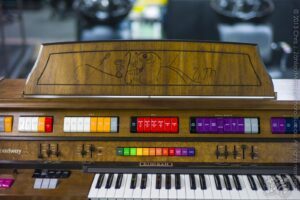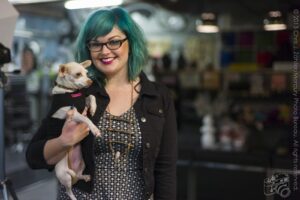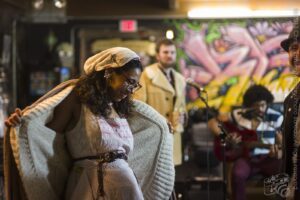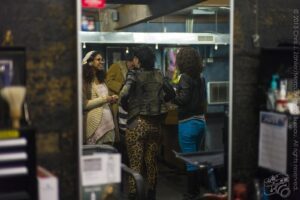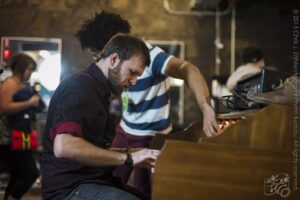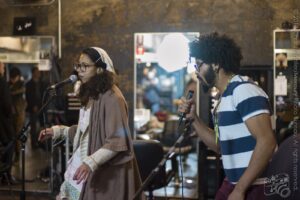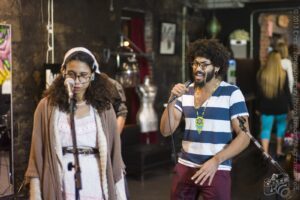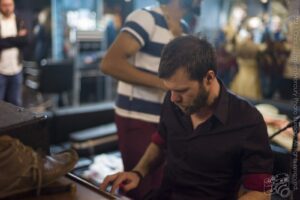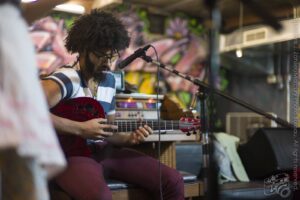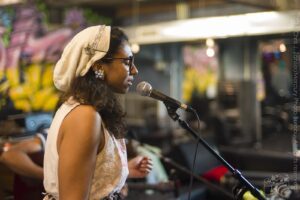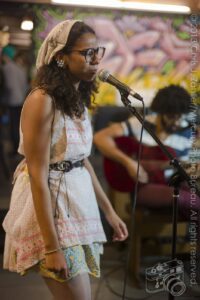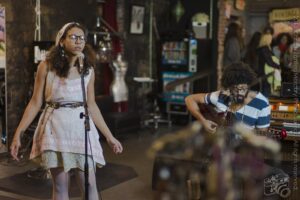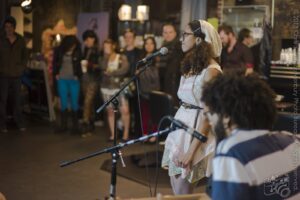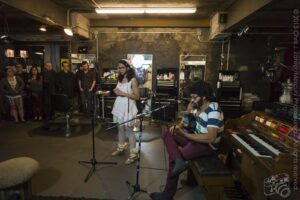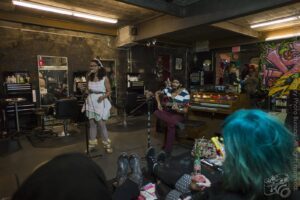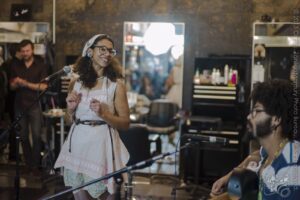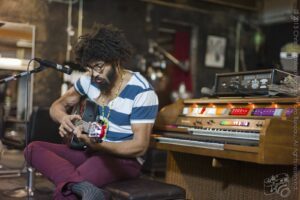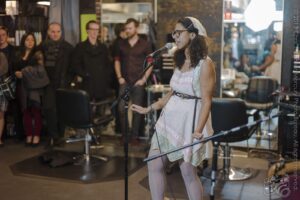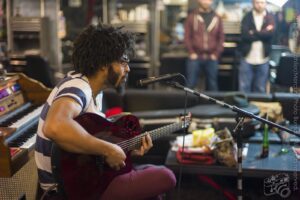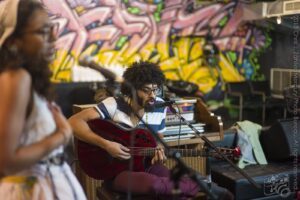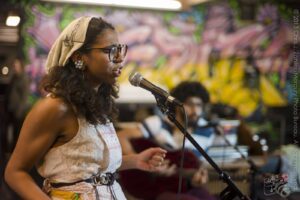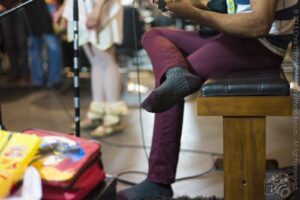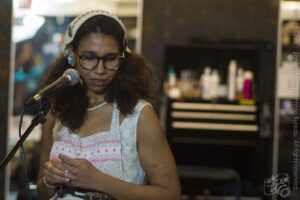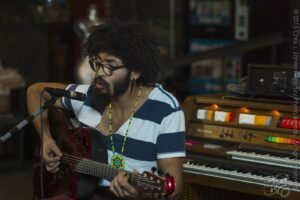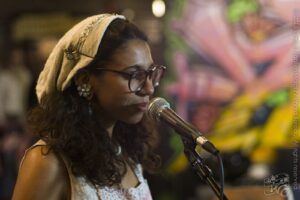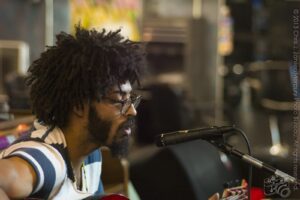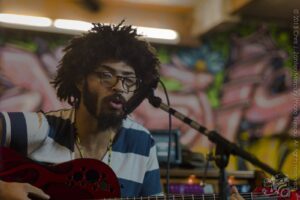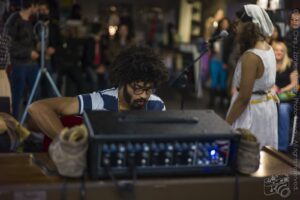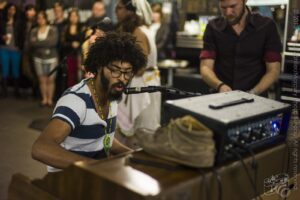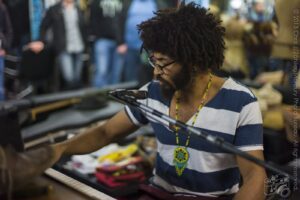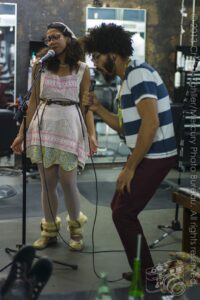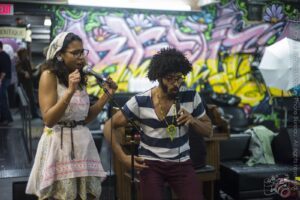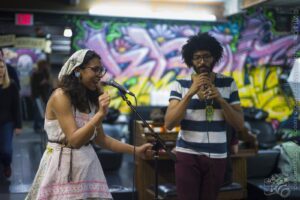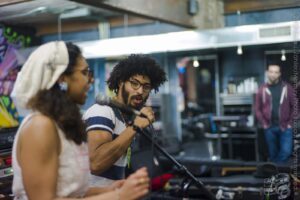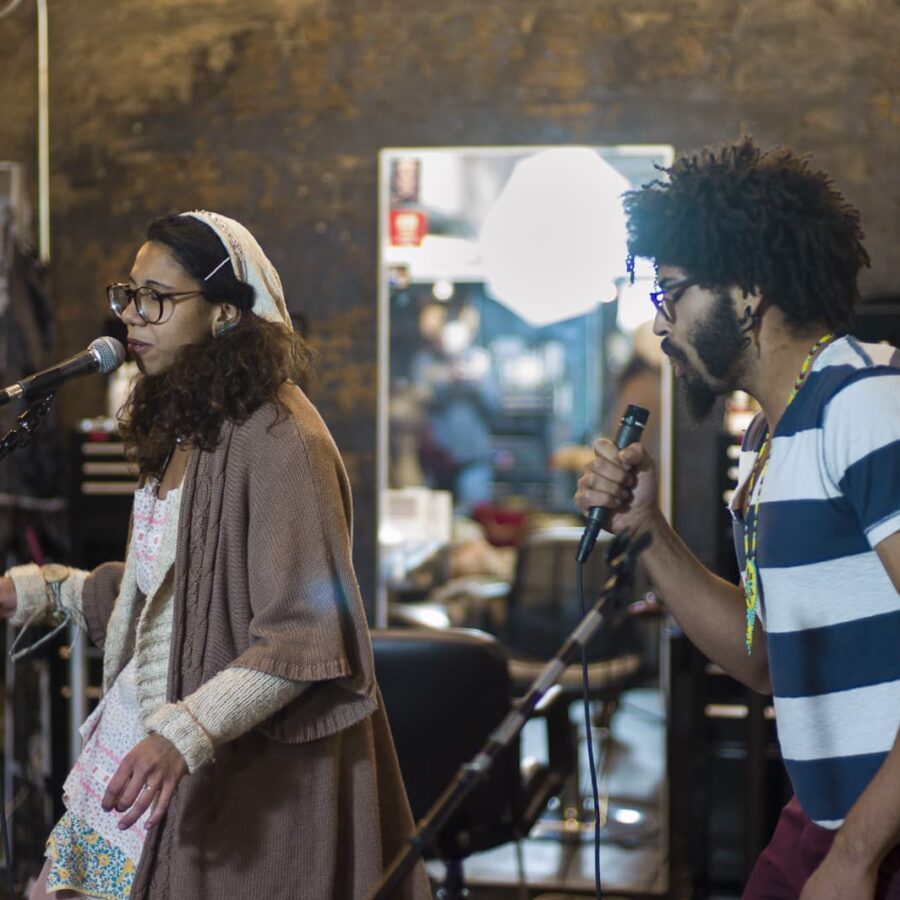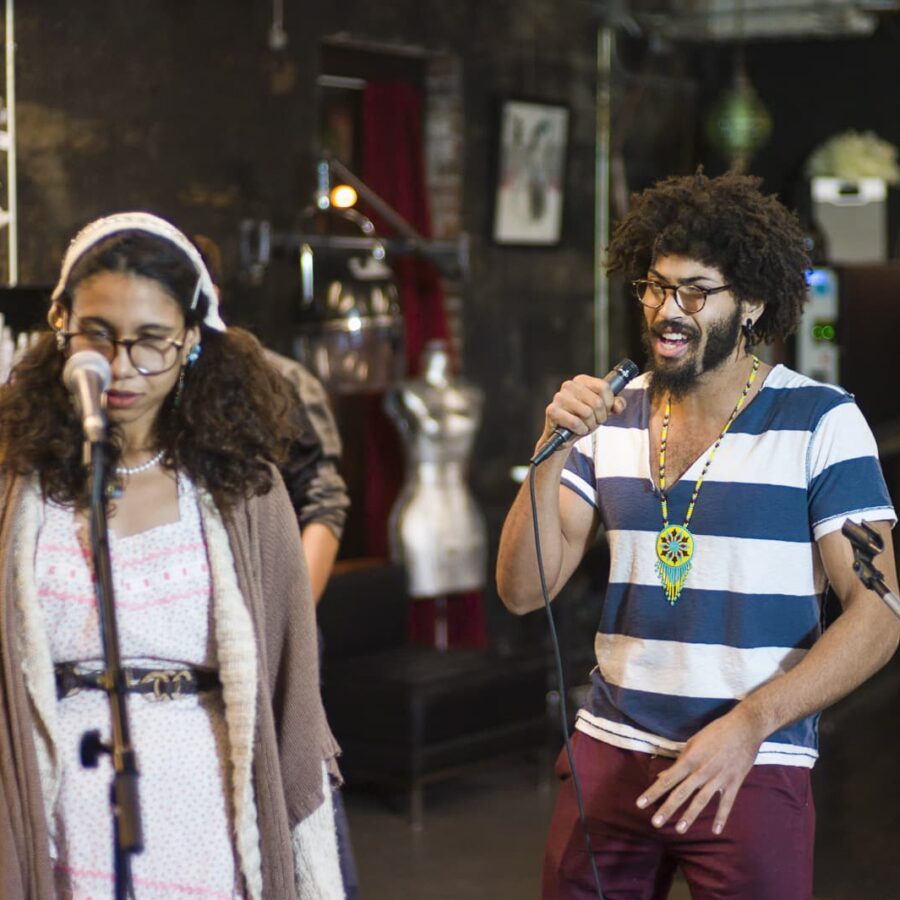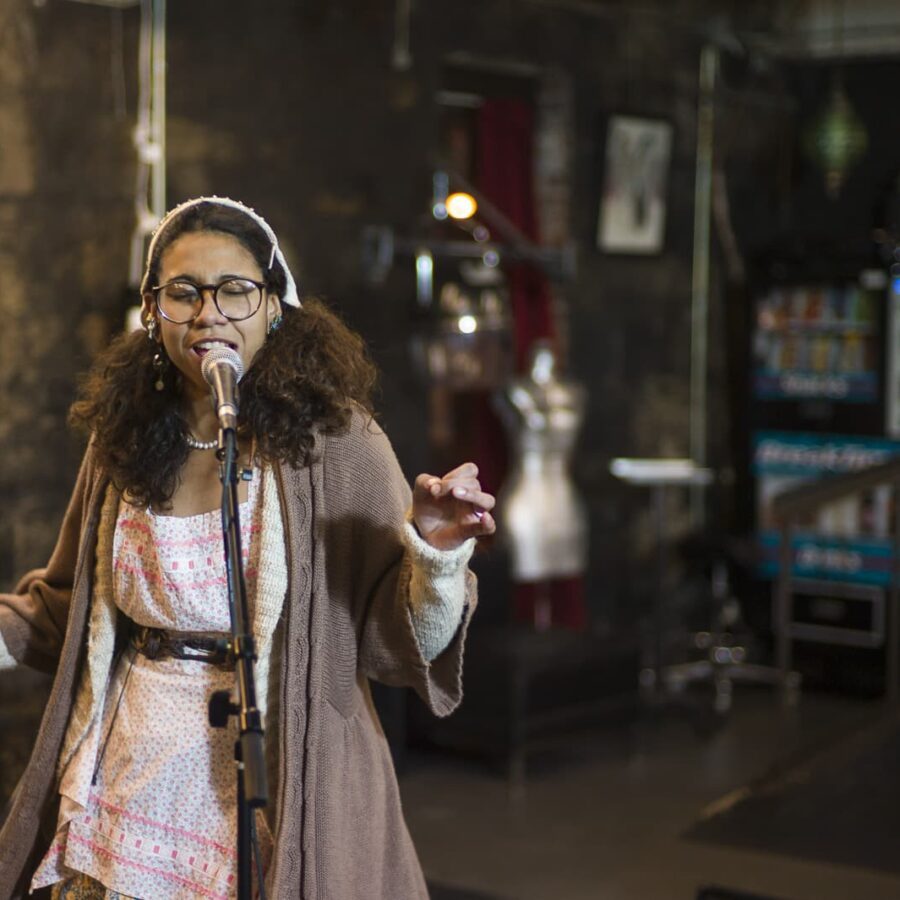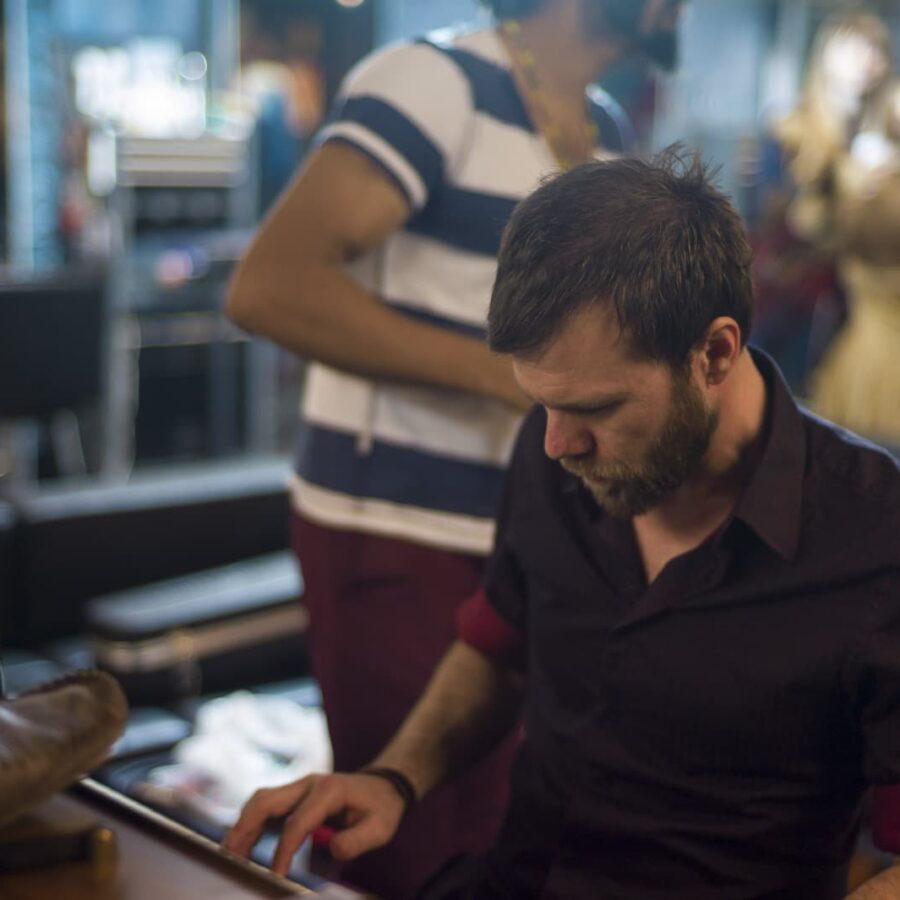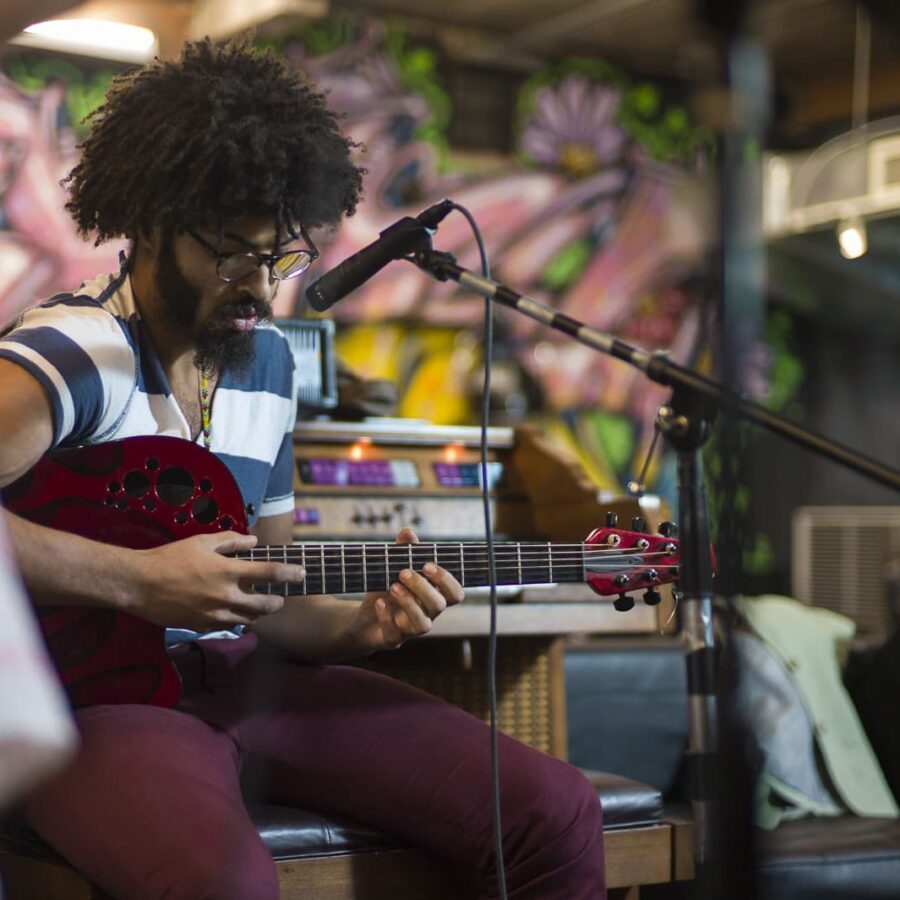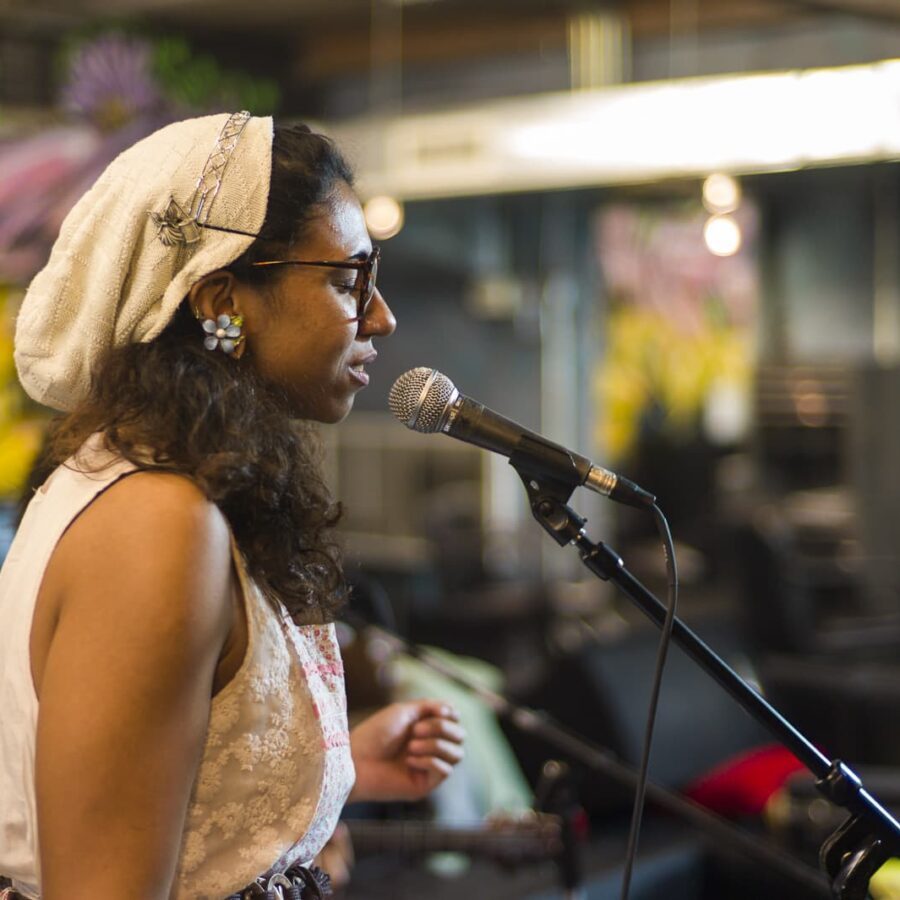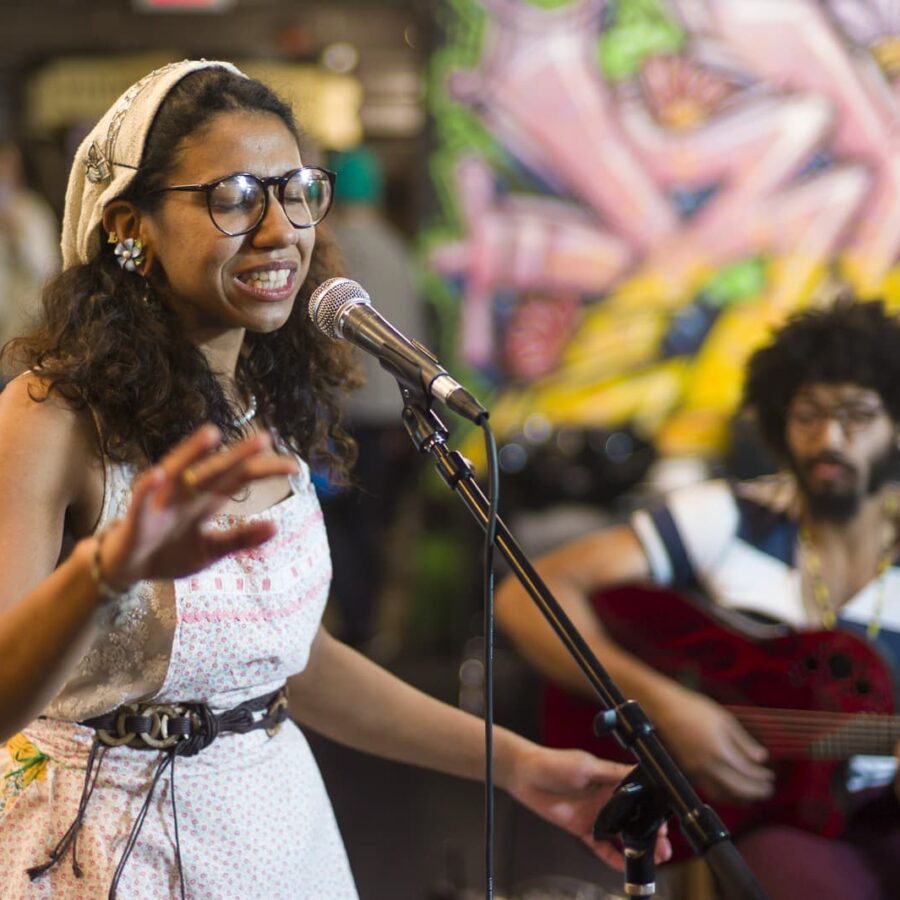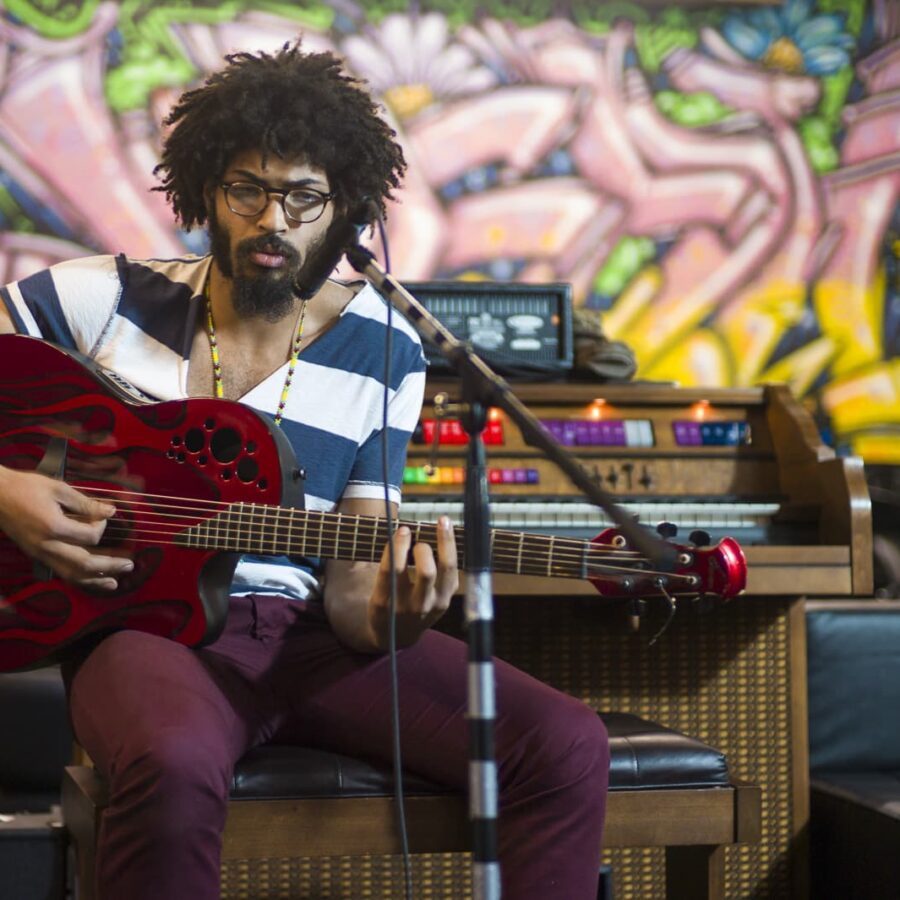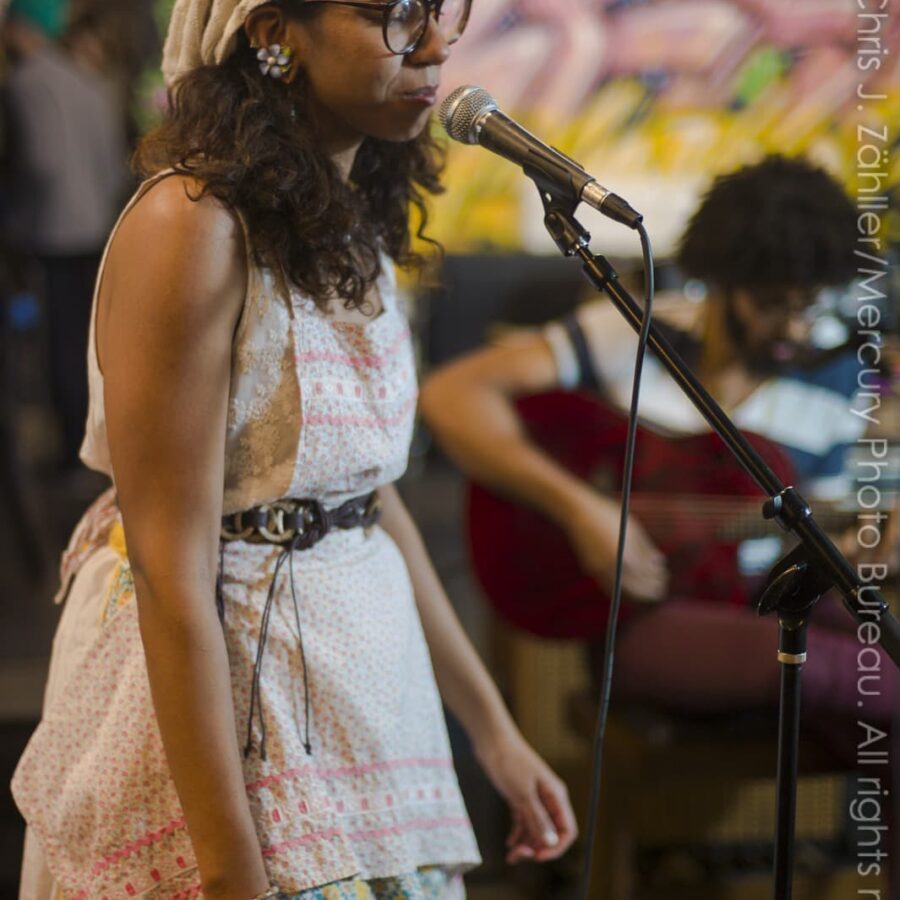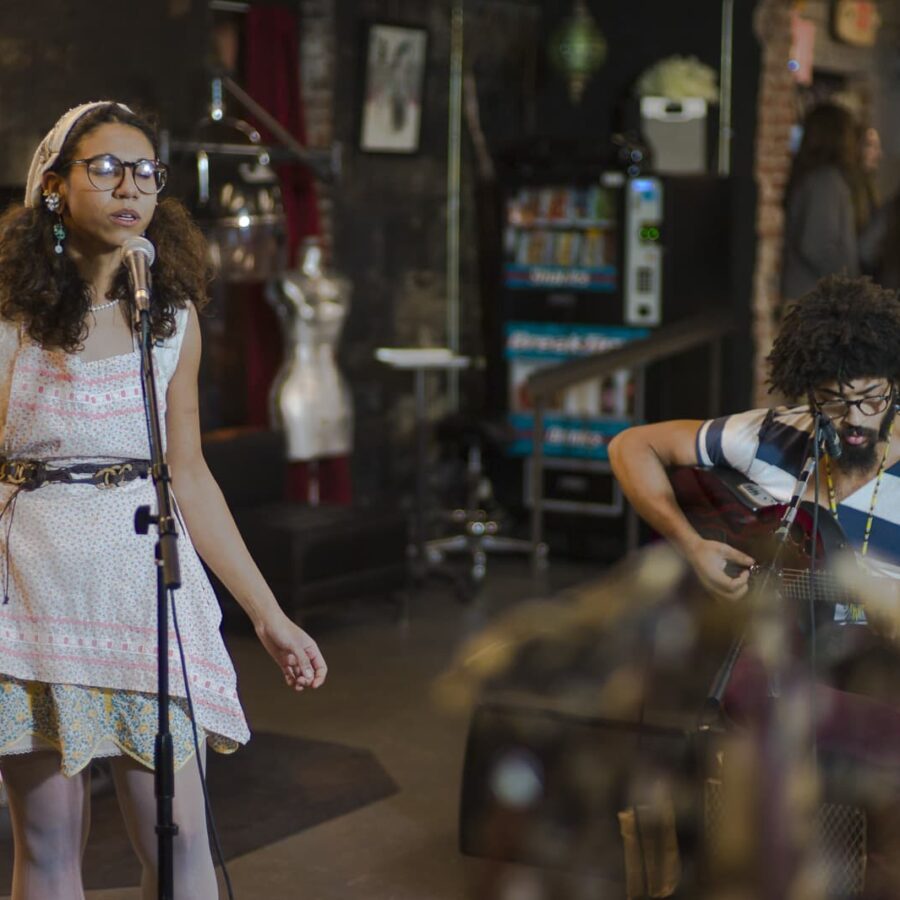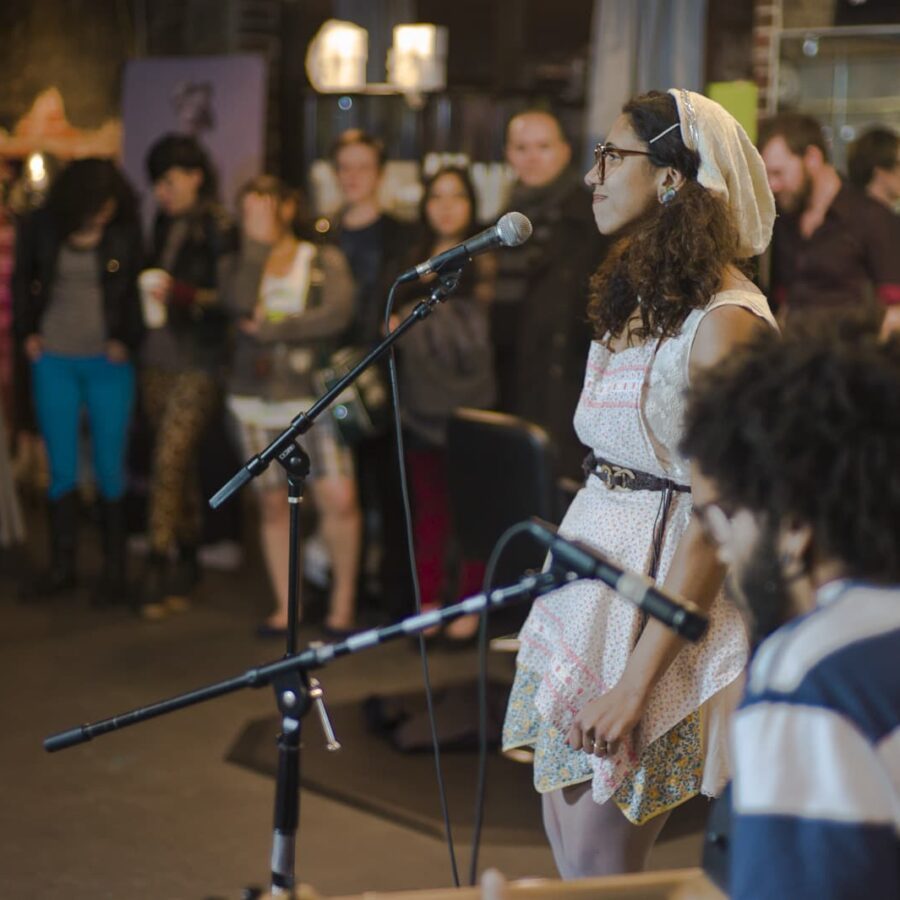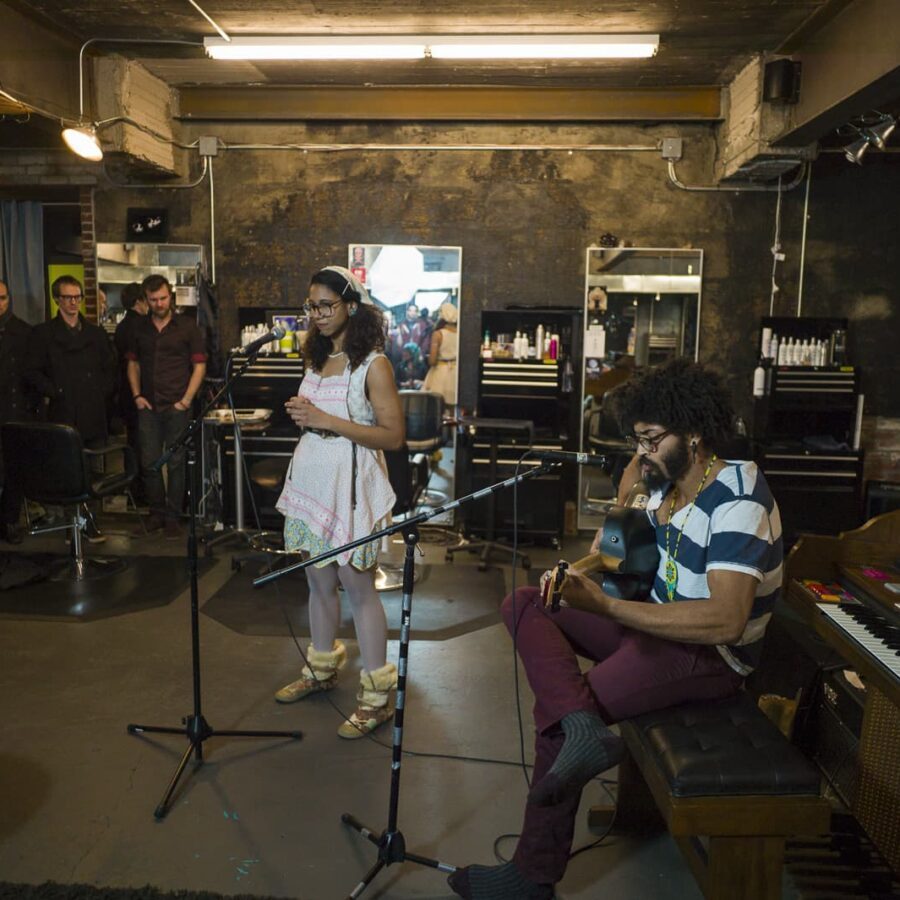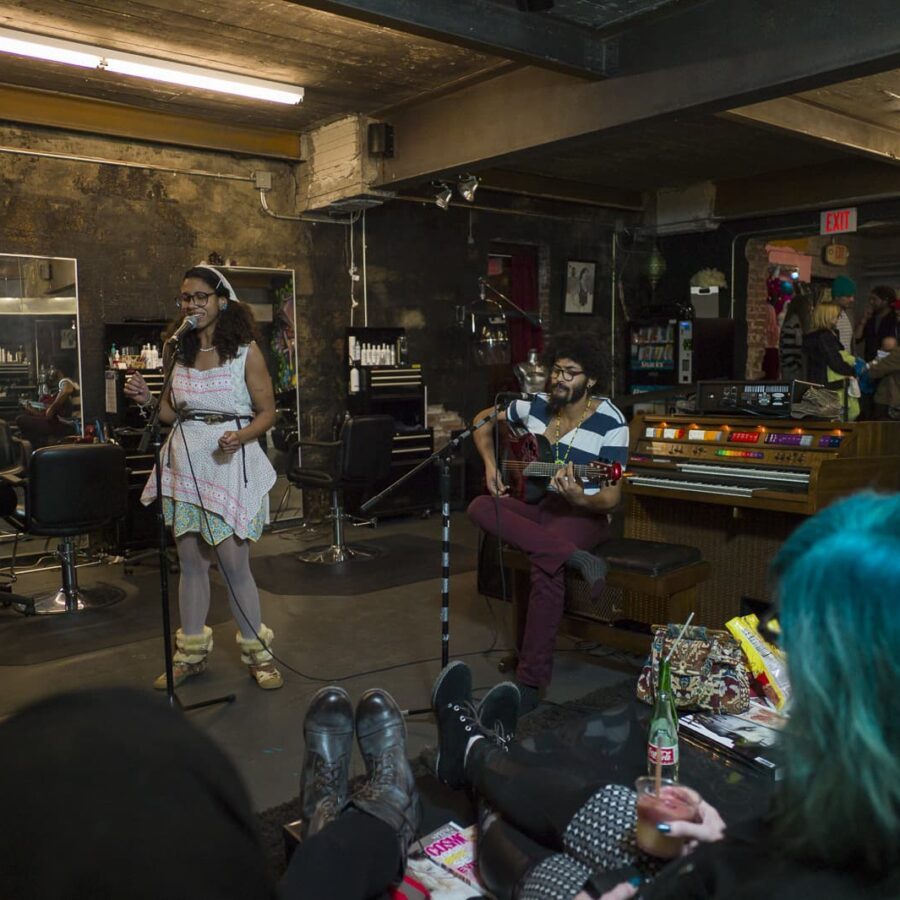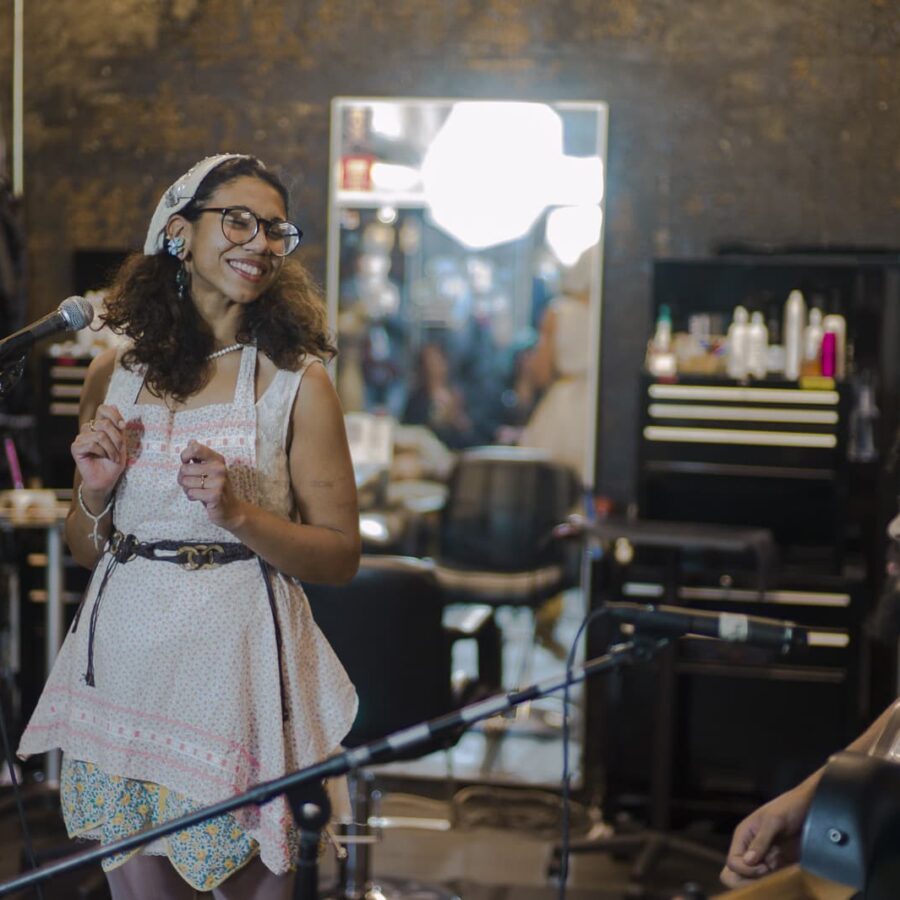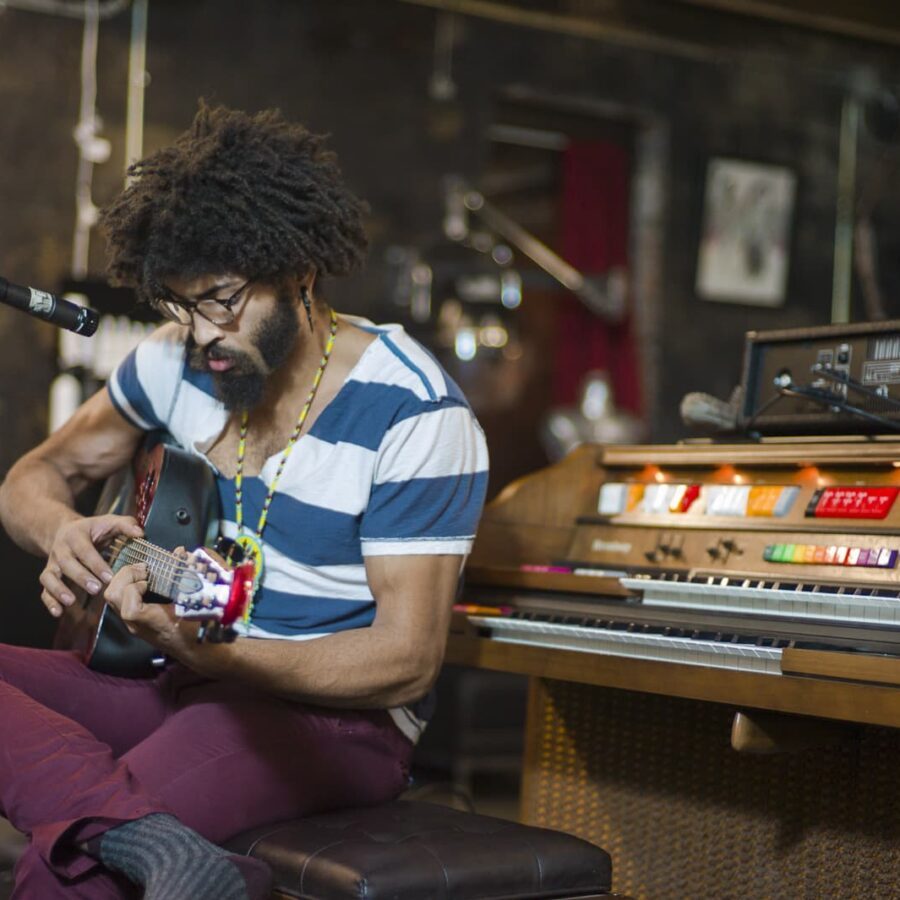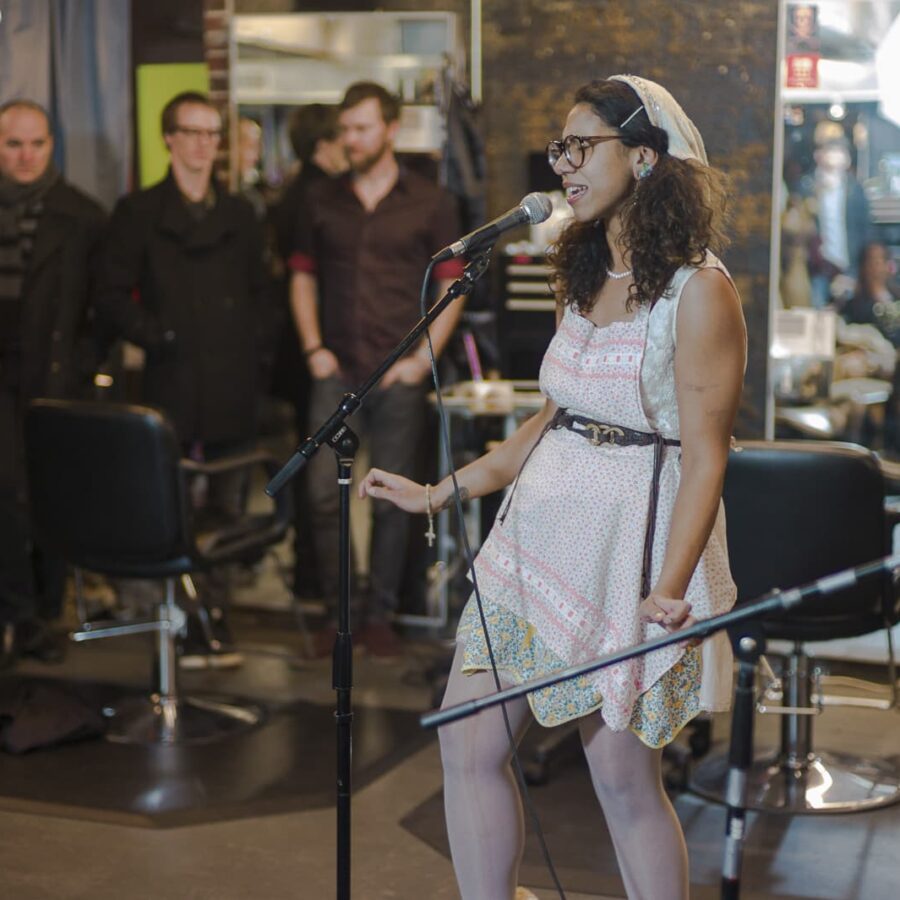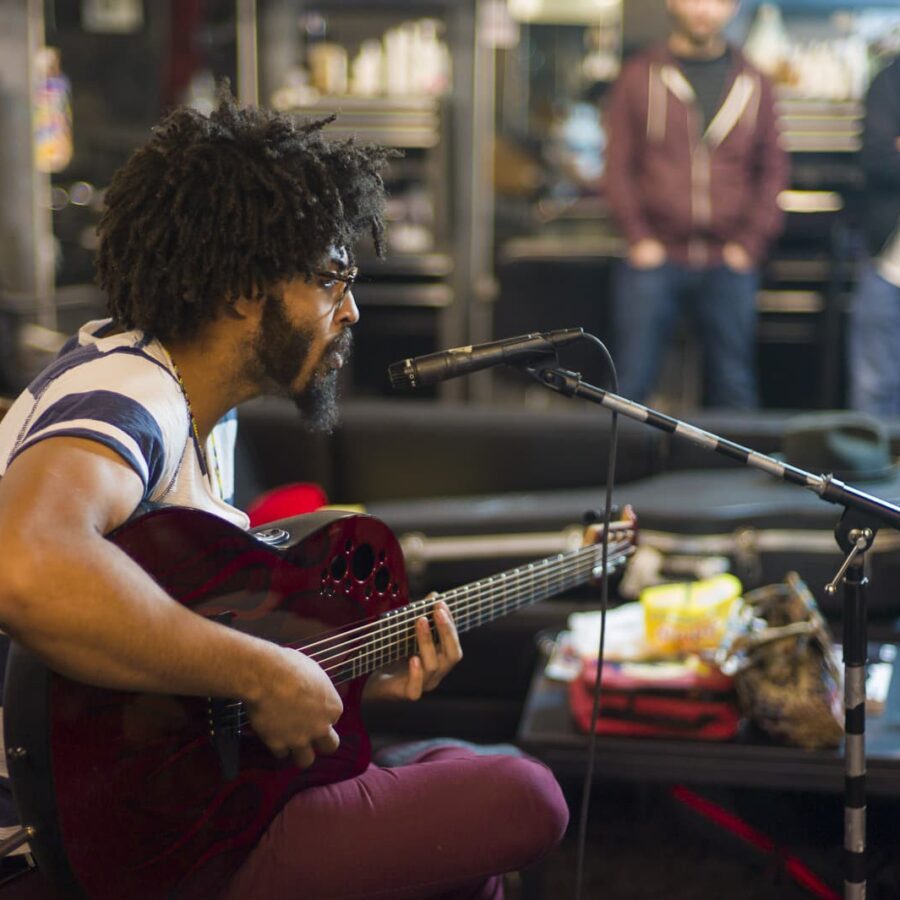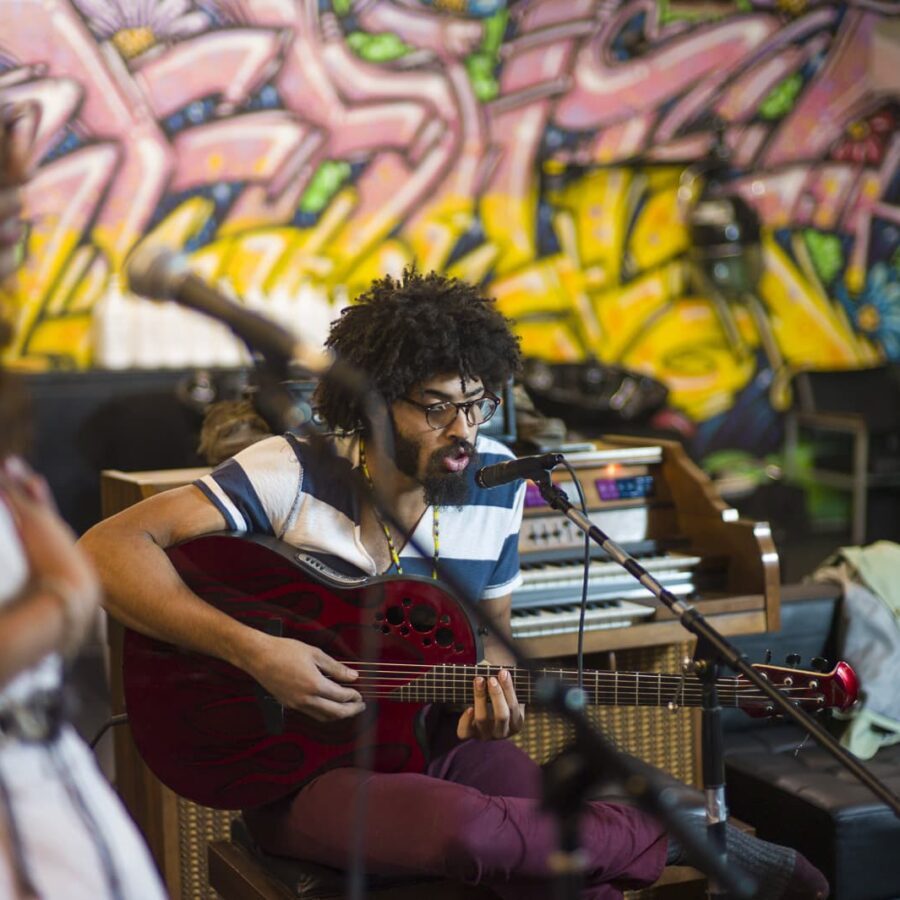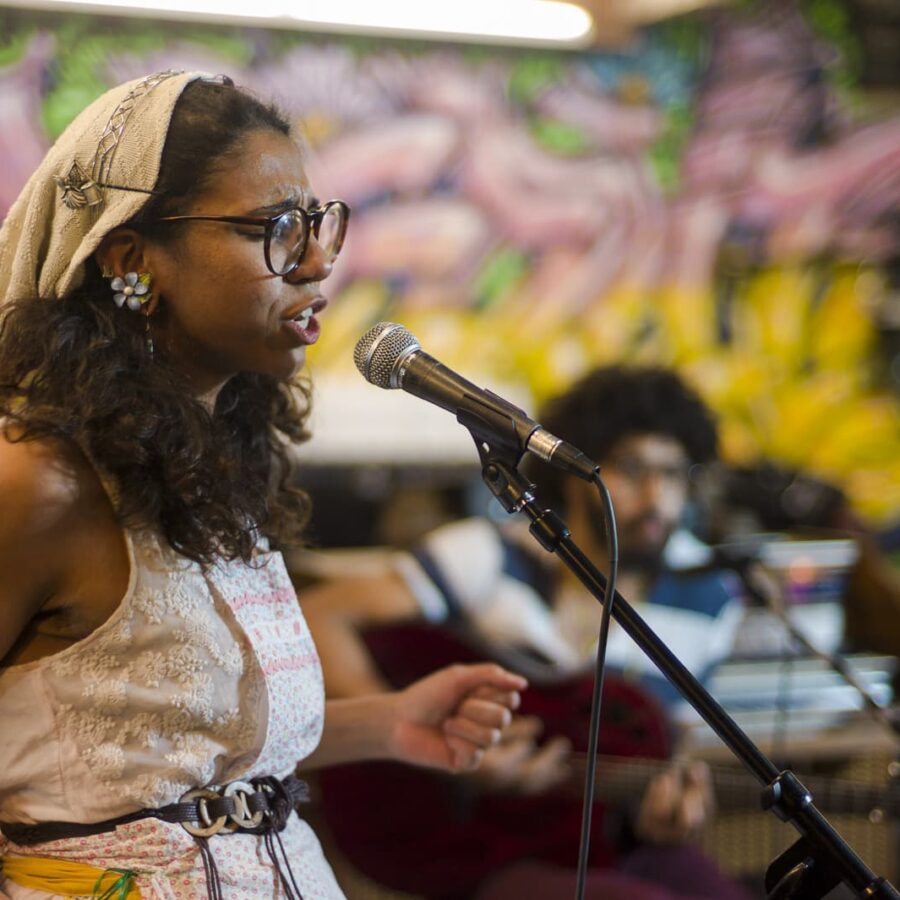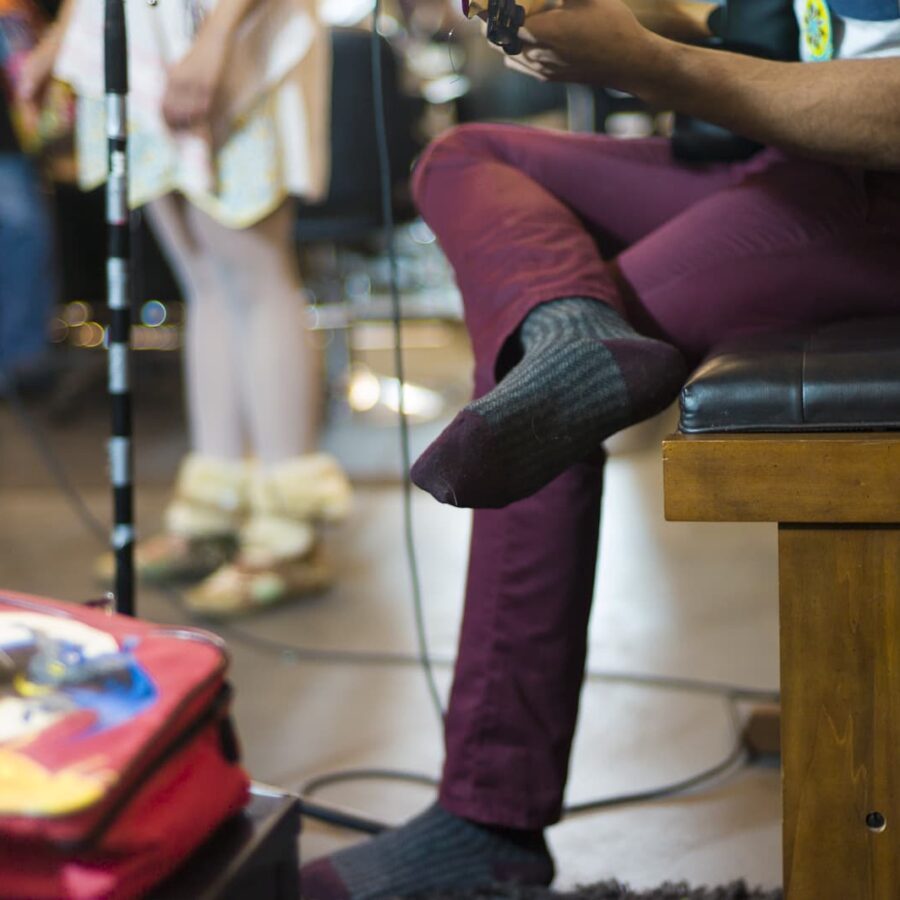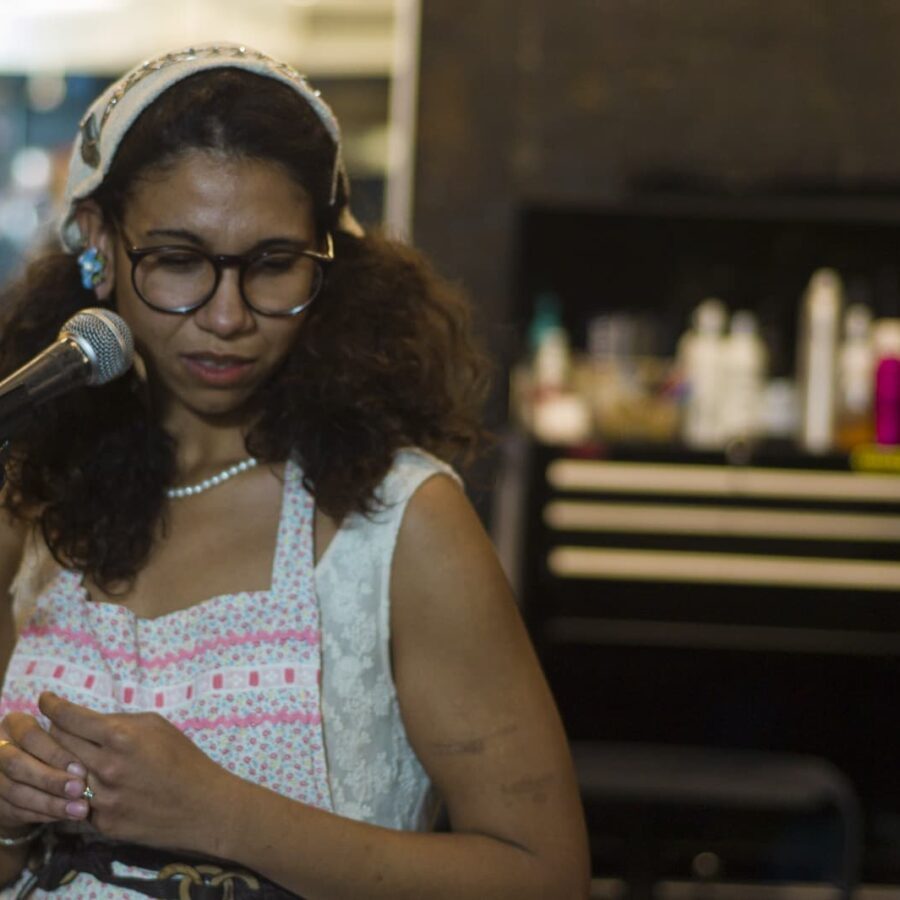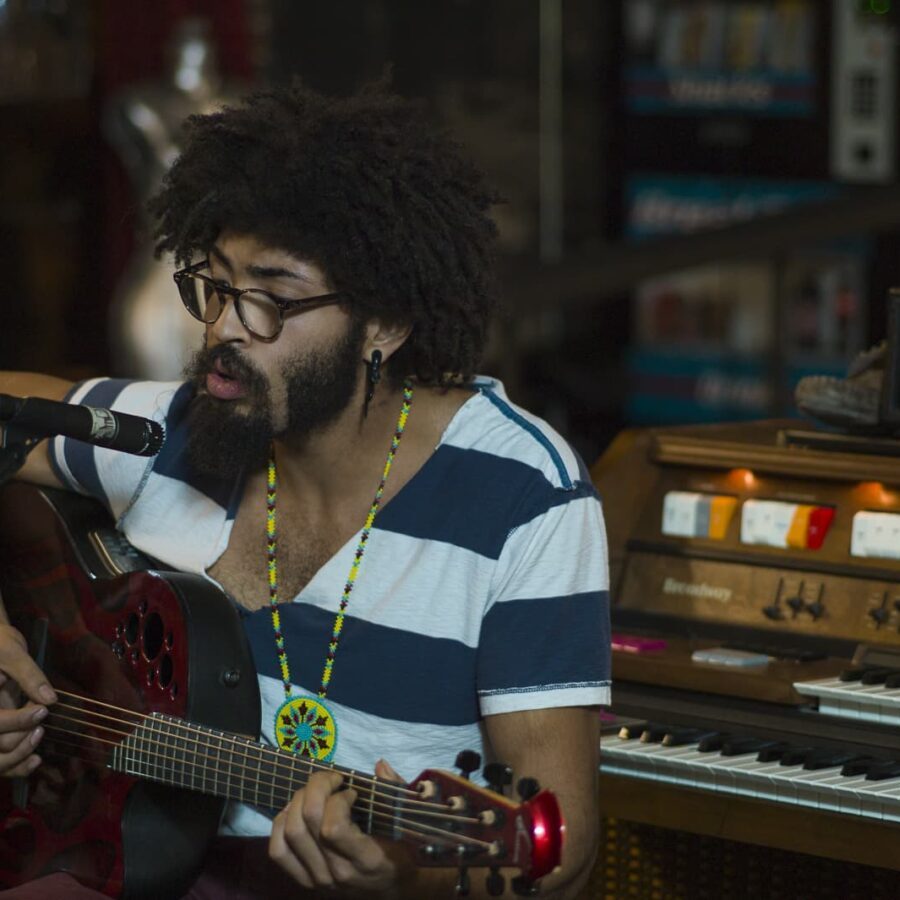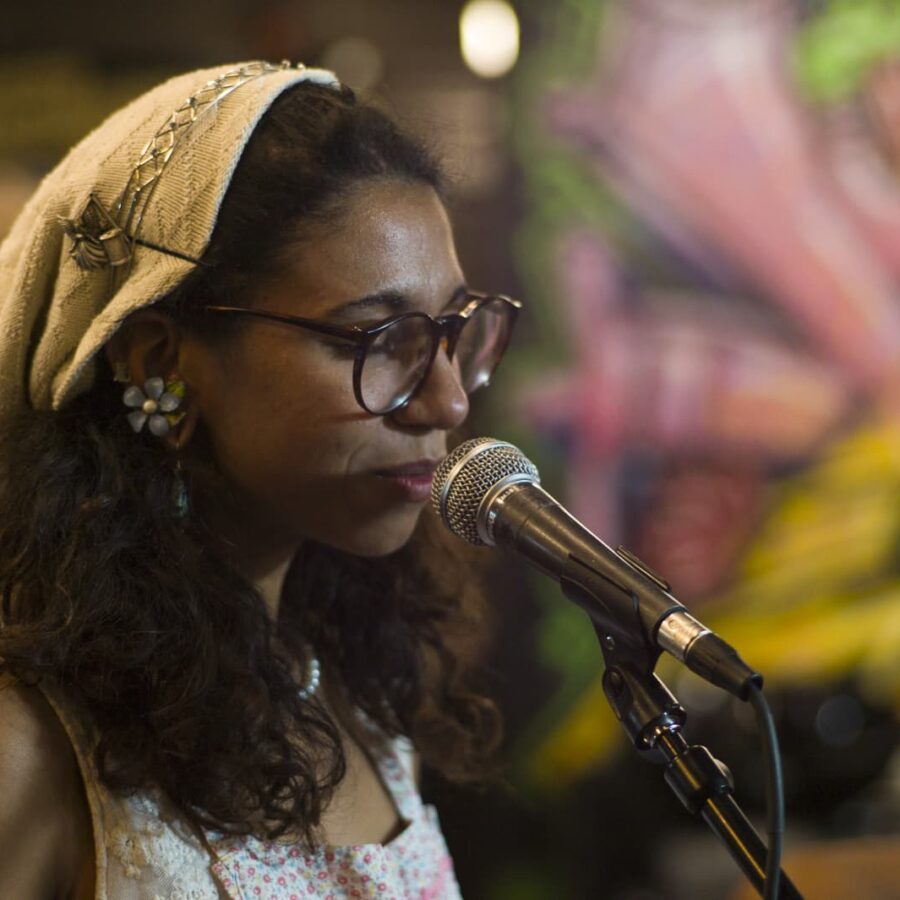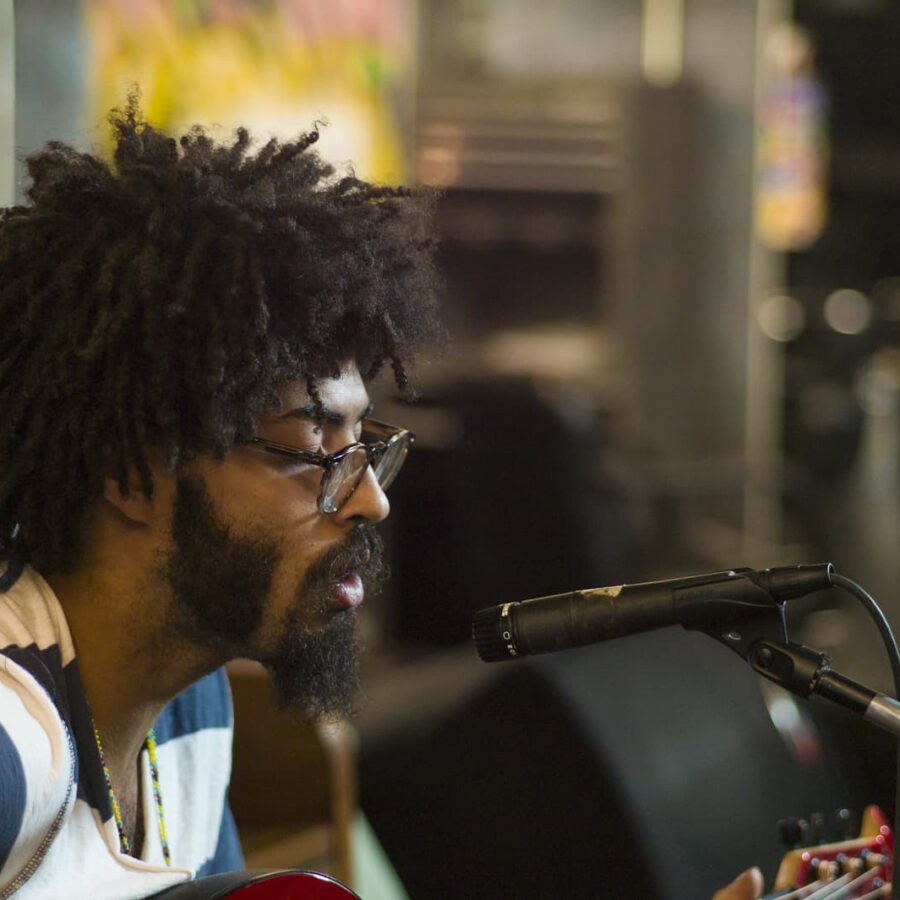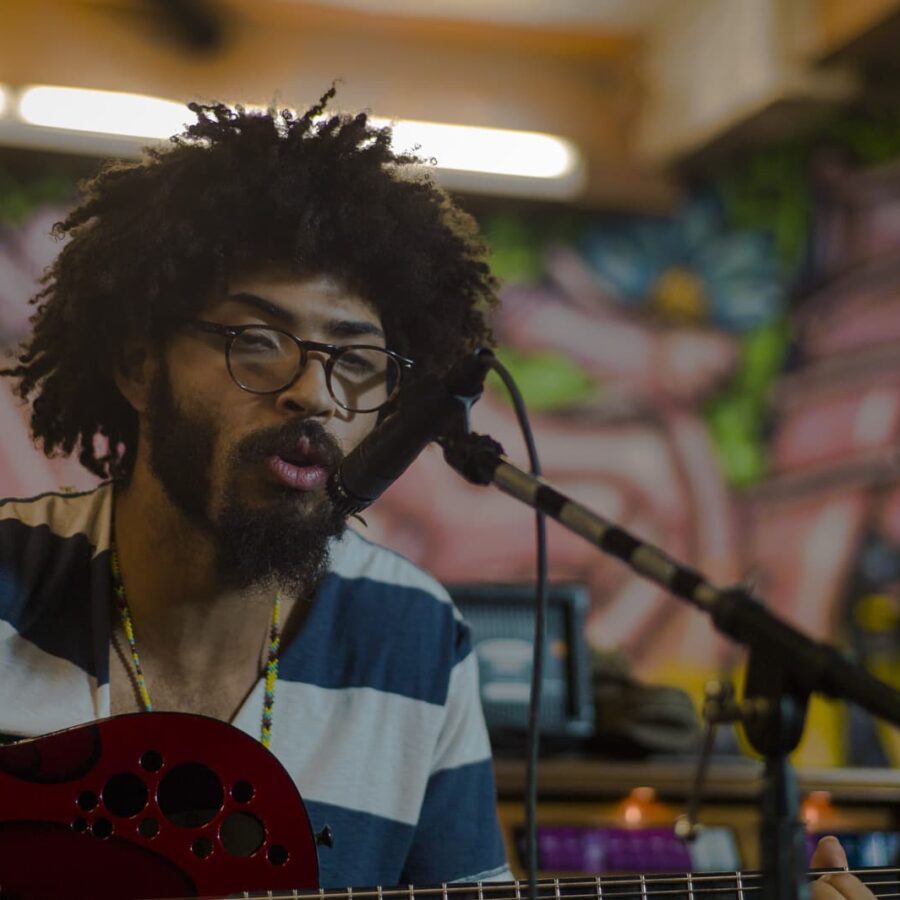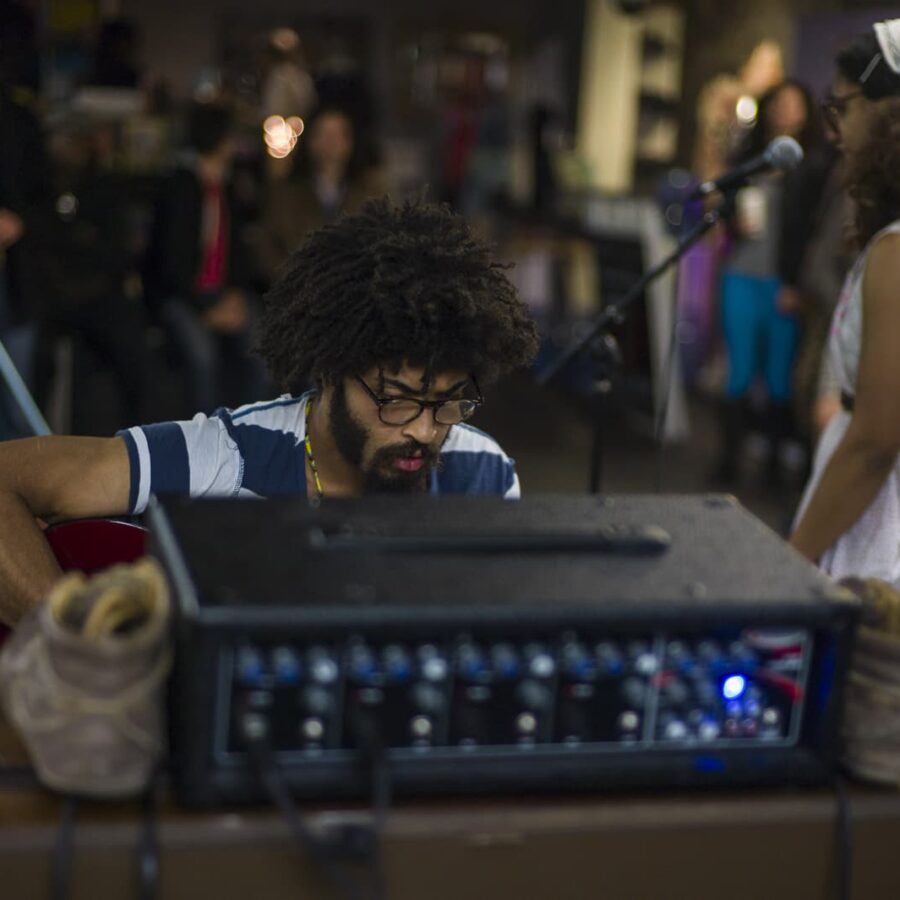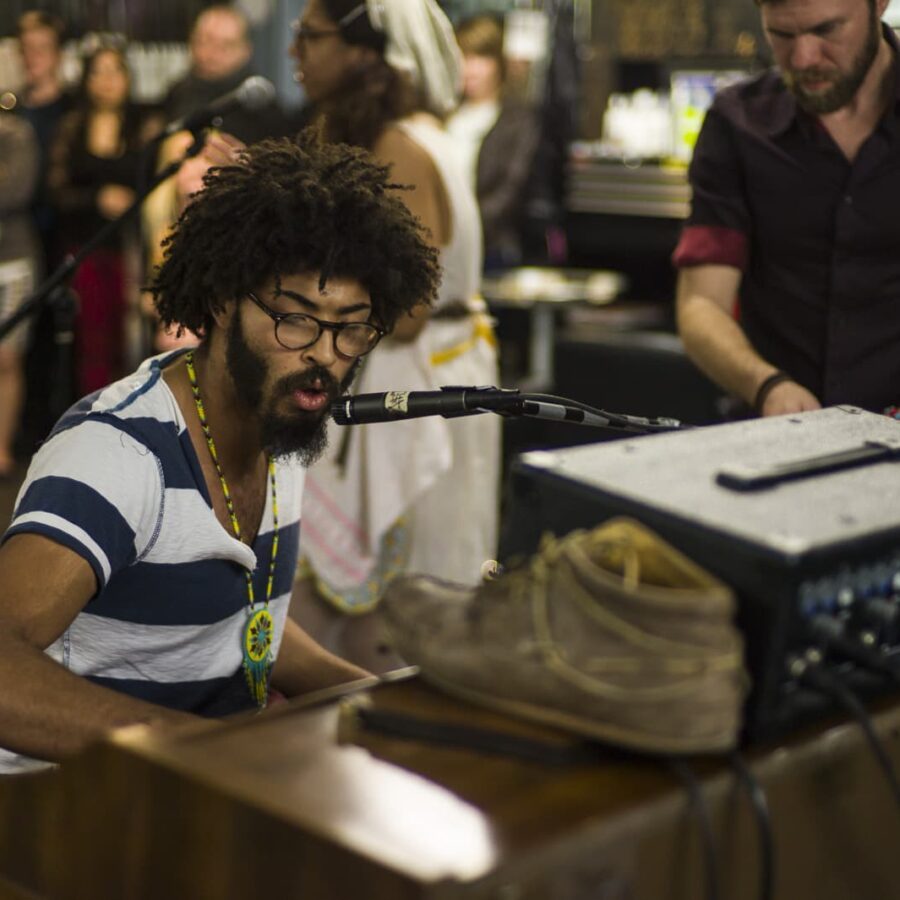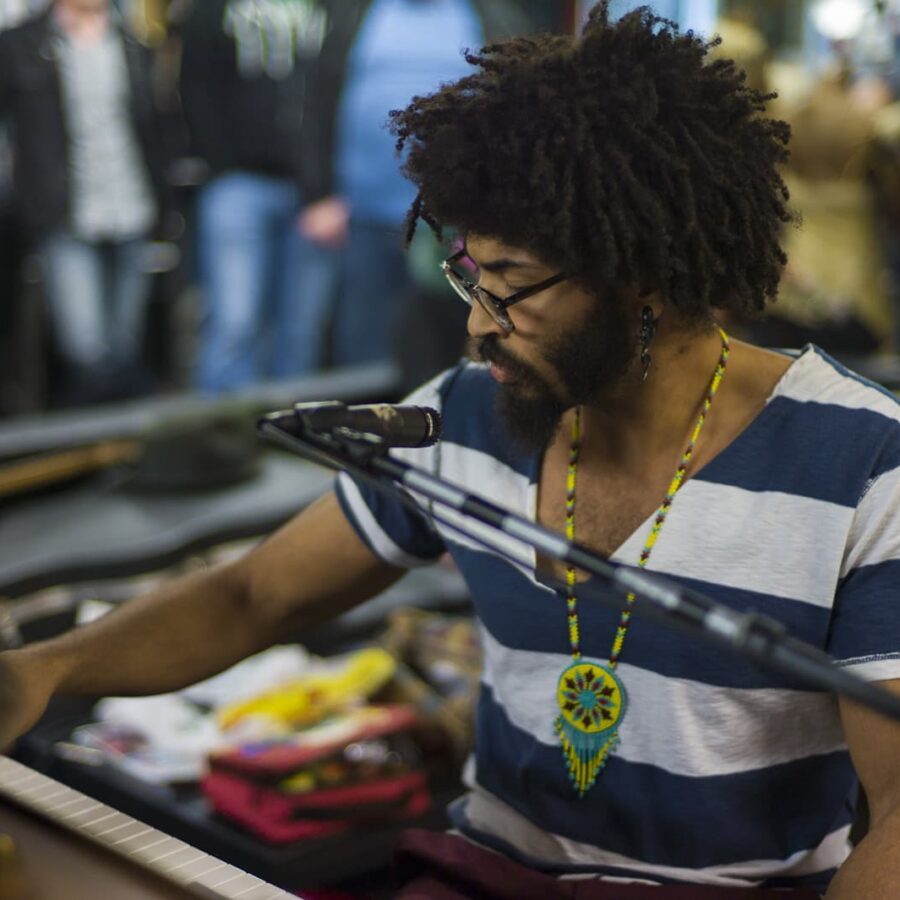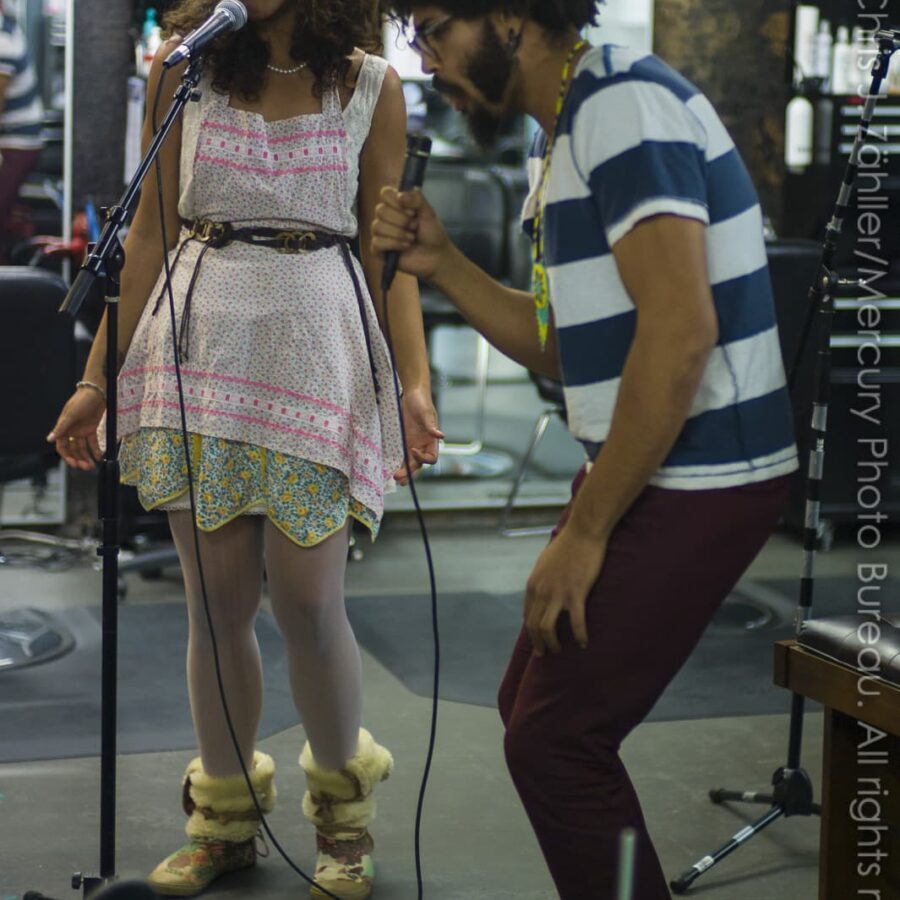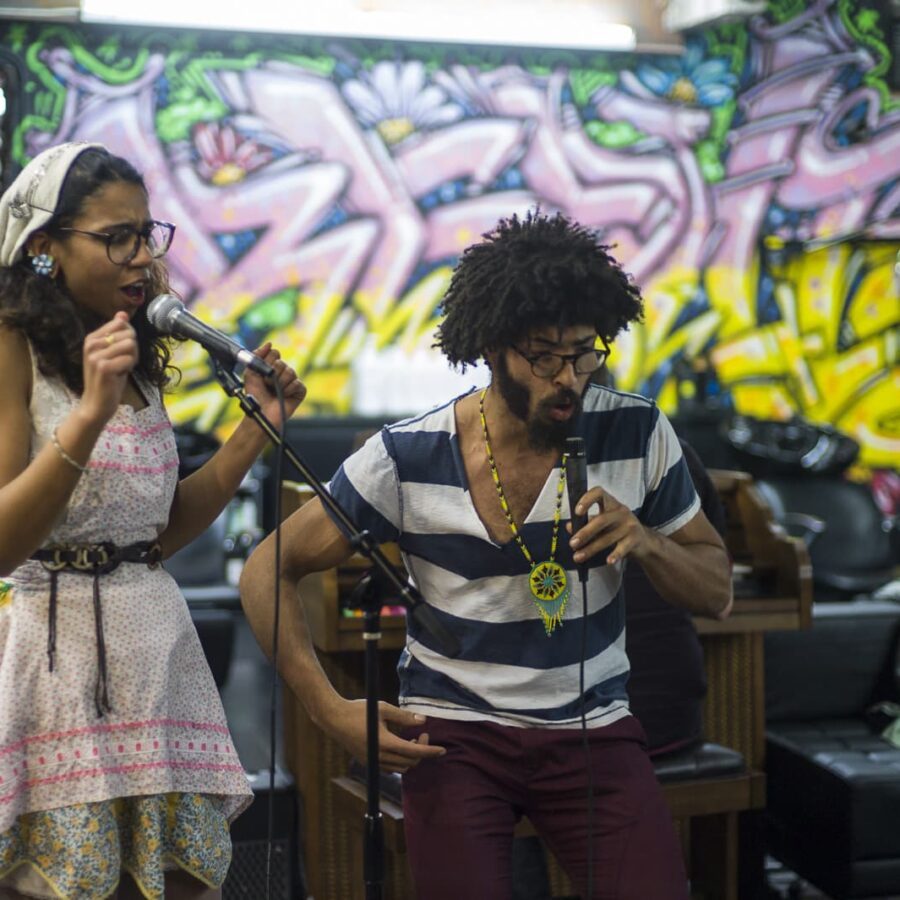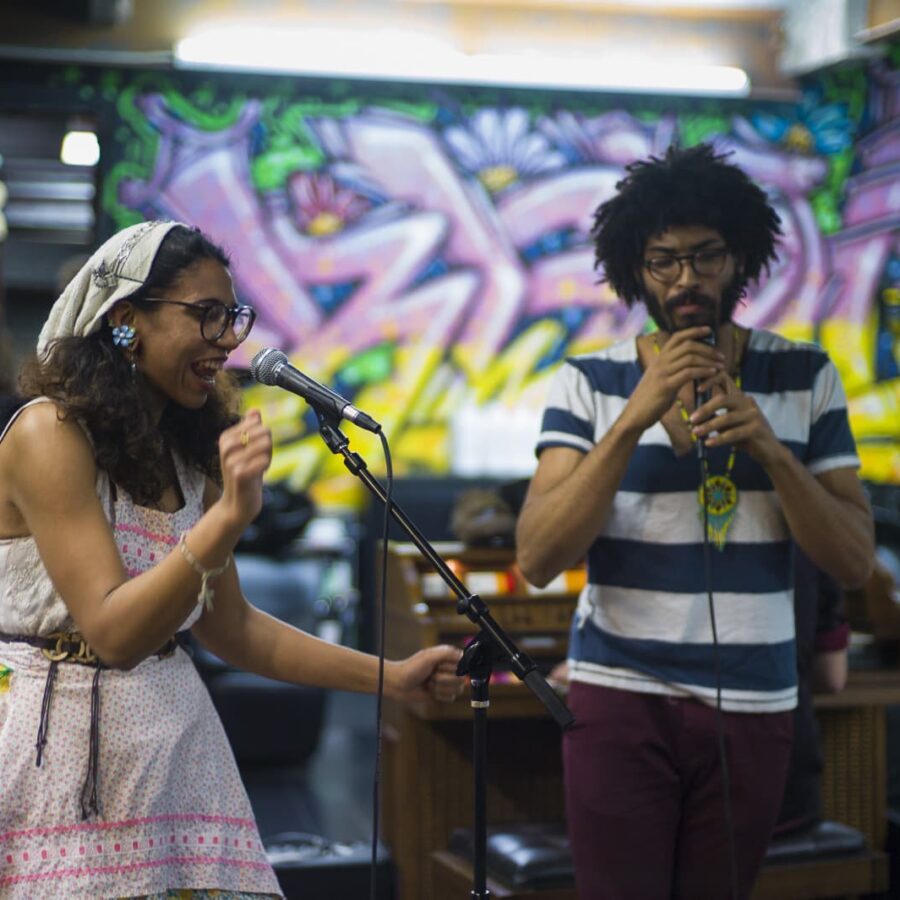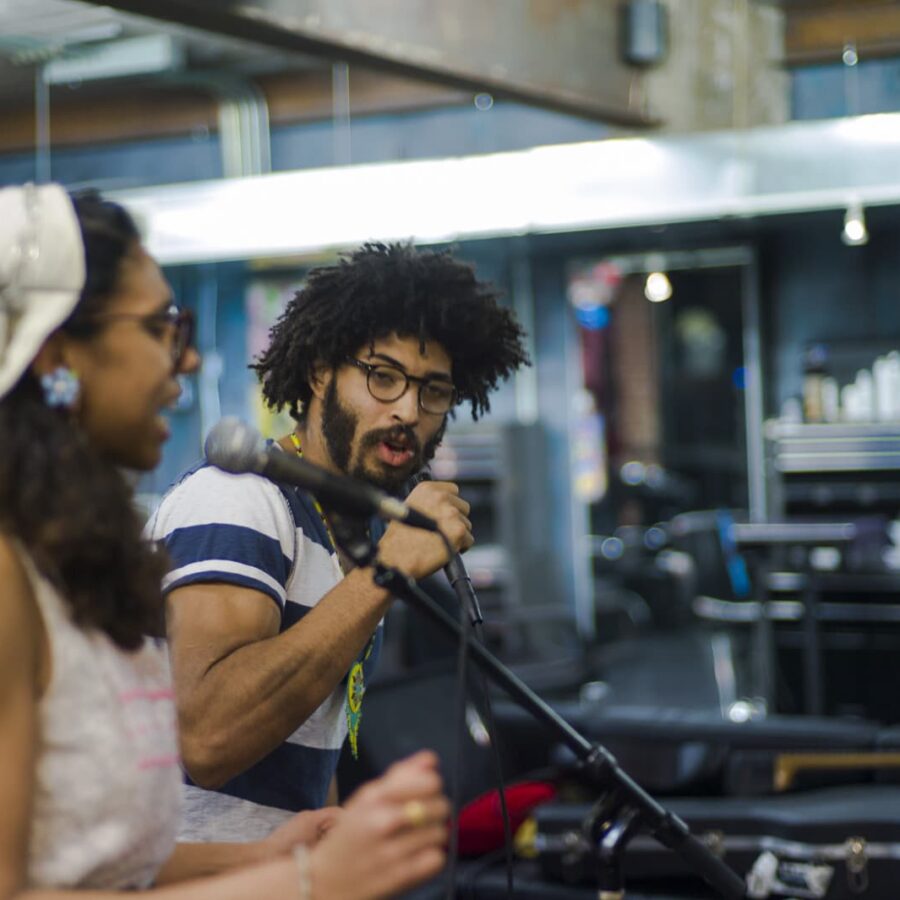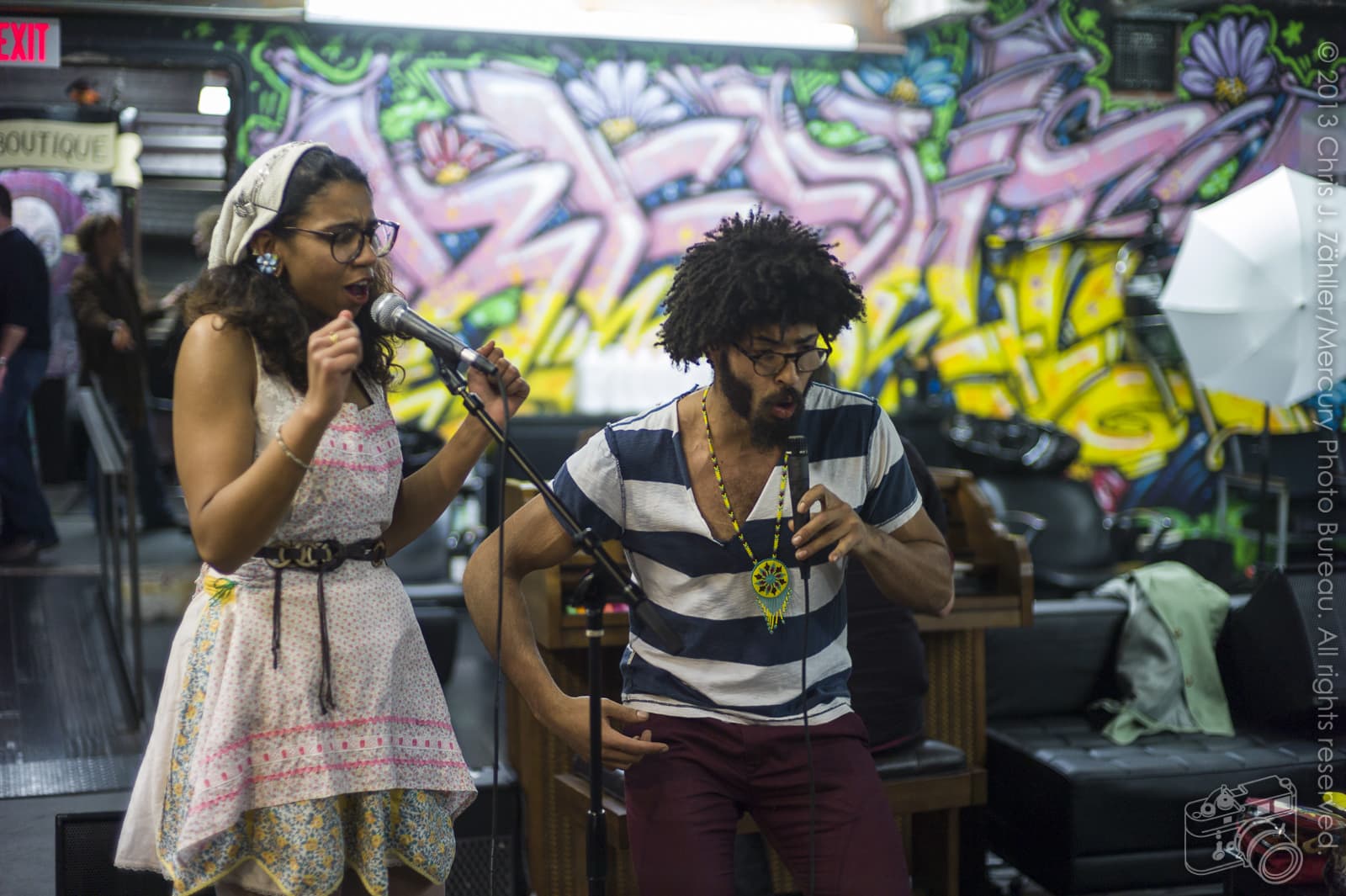
Bowlsey at the Velvet Monkey: Interview & Gallery
The Interview
We Are Bowlsey: The Interview
Acoustic duo Bowlsey is moving fast. They granted Mercury Photo Bureau an interview before their second public performance, and, in the intervening weeks, became only the second interview subjects for REV HiFi before joining a contingent of Oklahoma bands featured at this year’s SXSW. This bears repeating: they went from their first public performance to joining the Buffalo Lounge SXSW Oklahoma Remix Showcase in less than two months.
Singer-songwriter Clarissa “Cid” Castillo (a.k.a. “Cidward”) and rapper-songwriter, guitarist and ocassional organist Taylor “Shraz” Mercier settled on the sofa in the middle of the Plaza District’s Velvet Monkey Salon for a frank discussion of their past and present and their dreams for the future before being joined by their manager, Justin Hogan. [Sidenote: Since this article posted, Justin has become a full-fledged bandmember. Also joining as fulltime drummer is Donald Eisenberg.] Afterward, they entertained the music lovers gathered to hear them (while simultaneously confusing and delighting the late night shoppers coming out of the vintage furnishings and clothing store located in the salon’s rear).
Mercury Photo BureauIntroduce yourselves.
Taylor “Shraz” MercierWe are Bowlsey. I’m Taylor, also know as Shraz.
Clarissa “Cid” CastilloAnd I’m Clarissa, also know as Cid.
MPBWhy Cid?
CidWell, he [gesturing at Shraz] kind of named me that, because me and all my sisters have [nicknames inspired by our different attributes. My nickname is from Sid Vicious] because of all the rotten things I used to do.
MPBHow did you meet each other?
ShrazWell, we just bumped into each other in high school; [we] had never seen each other at the school until […] the end of the year. [We] bumped into each other, couldn’t tear ourselves apart […], but right before — I mean, we’d just met each other, and I was about to go back to Oklahoma [and] stay there for three months, and […] I wasn’t sure I was gonna be coming back.
MPBWas high school in Texas?
ShrazHigh school was — first half in Oklahoma, second half in Texas. [I] started college in Texas, [then] withdrew and came back to Oklahoma, and Cid followed me here.
MPBTell me about your musical backgrounds.
ShrazThe first interesting music for me was Trout Fishing in America. […] That was my band, as a kid, and, outside of that, Colin Raye, Garth Brooks, Jimmy Buffett; just a whole lot of that from my grandparents, ’cause I was raised by them.
MPBYou like songwriters who tell stories.
ShrazThat’s actually very true. That’s interesting.
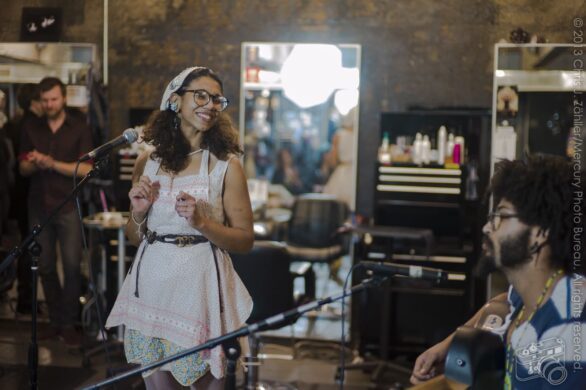
MPBThat eventually led you to being a musician?
ShrazMy grandmother put me in piano classes when I was in kindergarten. I had lessons for about seven or eight years […]. After that — that was kind of the first spark I had that I [didn’t] want to keep regurgitating the same things from recitals […]. I had a whole lot more ideas than what [I was] learning in these little classes […]. So I said, Why don’t I write some of my own things,
and I ended up coming up with [longer pieces that were] a whole lot more thought provoking than anything I was playing at the time.
That led to guitar, led to bass, led to electronic music, led to everything else. I did have [a few] guitar lessons, [plus] a little bit with bass, but after that everything was self-taught.
MPBDid you research on the internet, like watching YouTube tutorials?
ShrazNot really; I got enough tips here and there, more like — I was just looking for a kind of feel, looking for where my little niche was with my instrument; how to feel out my instrument, and just find my [musical] groove […]. That’s where I’ve spent the past couple of years; I haven’t really listened much to the radio. [laughs] I’ve just been focusing on the actual — like, Where do I lie?
MPBApart from radio, do you listen to much music?
ShrazI haven’t for a while. My father, Patrick Mercier, was someone who always listened to music; the whole entire — any time you were in the car, any time you were around him, there was always music going. I appreciate that; I love music, but I just had to take a while — of silence, and, in that, I started writing more and more of my own music. It just put me more into my own thoughts.
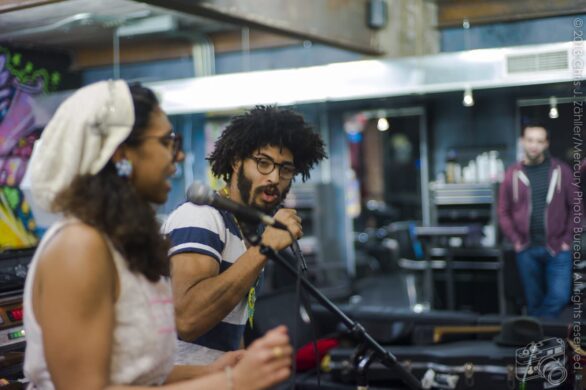
CidMy mom and dad were runaways when they met each other; my father is aborigine Australian, and he was a […] punk kid when my mom met him. My mom was in a [Houston] gang — she was a chola. My grandmother on my dad’s side is full-blooded aborigine; my [paternal] grandfather is Australian; he took her and kinda “smuggled” her over to the U.S., and she acclimated to Louisiana. [My father] was mostly raised in Houston; [he was] a bit of a mud dog [and did] construction.
And, he listened to a lot of rock; a lot of Megadeath, and Ærosmith, and a lot of White Zombie and Rob Zombie. And my mom [listened to] South Park Mexican and Notorious B.I.G., Tupac; a lot of Houston rappers, too.
And I started orchestra [playing] viola. I stuck to viola, and I submerged myself in orchestra […] until senior year, when I really started listening to [Shraz’s] music, and we really started talking more. We were engaged by that time.
[…] I used to sing punk music a lot with my friends — it’s so terrible; I was in high school —
MPBCould you give me an example?
CidWhen you … hear … stuff that I used to listen to; like Jack Off Jill, Scarling, Mindless Self Indulgence, stuff like that.
MPBYou seem to be ashamed of that. Why?
CidBecause, there’s so much more. I kinda [realized that] after [Shraz and I] started talking to each other, and [I was living at a friend’s house] and [Shraz] ended up just staying with me all the time. And he was listening, and he said, You could do better; you could do a lot better.
ShrazI always tell you, not that you can do better; everything was there; you were just delivering it wrong.
CidYeah; it made sense with the song you’re gonna hear during the show; it’s called Extracurricular, and it was foul. Even though it’s the same lyrics, the way it’s delivered, the feelings that were sent through it weren’t the same.
I gotta say that Shraz made me grow up [musically]; after a while, I started listening a lot to acoustic [music], and I started to understand more about vocals and delivery and lyrics.
MPBWhen did you decide to perform in public?
ShrazTechnically? Last month. [laughter]
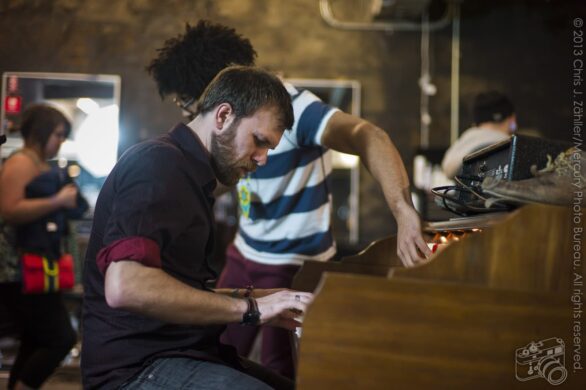
MPBWell, how did it happen?
ShrazIt’s just been something we’ve been leading up to. We had our own musical backgrounds, completely separate; we didn’t listen to any of the same things growing up; then we became musicians, developed our own music, and then [we met] each other. Grew up —
MPBWhen you say, Grew up,
how old are you?
ShrazI’m twenty-one.
CidAnd I’m twenty. He met me at fifteen, and I raised myself. So I was basically just a walking nightmare.
ShrazThere’s been a whole lot of growth between us […].
MPBHow did you meet Justin Hogan?
ShrazAfter we moved to Oklahoma, we were living with my grandmother. We got kicked out of there; Cid was working at an apartment complex at the time, and she […] got us a good deal on an apartment. six months later, we were helping a friend clean up a house he lived in, and I looked around, and I said, You know, I never really looked at how nice of a house you have; I’ve been here tons of times, but, it’s a nice house!
I mean, especially after spending eight hours cleaning an oven, [I had a lot of time to observe the house].
CidYeah, I was a renovation maid, which means you go into houses […] and you make it look like [nobody’s lived there].
ShrazWe basically did that for this house, and after we discovered the house that was actually under [the grime], we asked [our friend] what was the price […]. And it was […] five dollars less than [our apartment rent]. And we’d be getting an extra bedroom […].
[Justin wasn’t living next door then], but he was there [by the time] we moved in, because he was house- and dog-sitting. He’d hear us jamming, and he found it really interesting, and he was like, You really need to show people this; I know that you think that you’re just goofing around, but this is actually worth sharing.
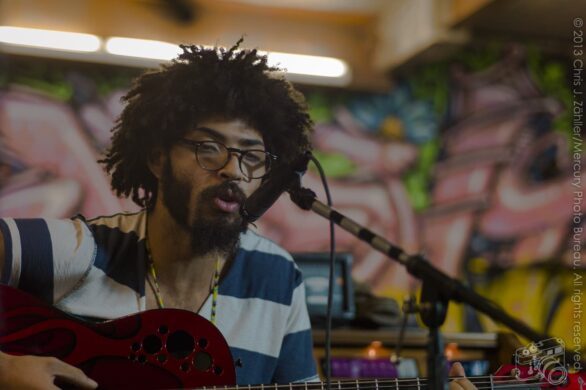
CidHe did a [school] project about us. [Sidenote: Justin attends classes at the Academy of Contemporary Music at the University of Central Oklahoma.] [It was] a little slideshow about us, recorded on his phone, performing a song [while we were sitting] on the couch, and the [other] students […] loved it. He calls us and says, Hey, you guys want to come to ACM and play for some kids in a class?
ShrazIt was an artist’s development class. [There were about ten students and the teacher, Dr. Trey Rick].
After we were done playing, they critiqued us. Even though I don’t think we had done our best, everyone just kept giving us positive, positive, positive, positive; you know, wanting to see more, even the tiniest little bits we could give them.
CidYeah, we only played three songs, just guitar and voice. We couldn’t even bring Kimmie because it was raining. [Sidenote: Kimmie is the larger of Bowlsey’s two Kimball organs. The smaller organ they brought to the Velvet Monkey is “Little Kimmie.”]
MPBOkay, tell me about the organs.
ShrazThe first one we got was when we were still living with my grandmother, and that one wouldn’t even fit in my car; this one [gestures at Little Kimmie] does. It’s a Broadway; the first one is a Kimball Paradise. That one is just 3″ wider, [but it has] quite a few more features. But that 1’s the house organ.
MPBAre you attached to analog, or would you be just as happy playing a digital synth with an organ plugin?
ShrazI couldn’t do that. When you see it there — it’s part of the show. Some people have lasers; I have an organ.
MPBWhere does the band name come from?
ShrazBack in Texas, [whenever we were hanging out with friends,] everyone being mischievous, we got bowlsey. We didn’t get ballsy; we got bowlsey. And it was for all the little mischief, from toastin’ to boastin’. Of all the names I could have thought of, it’s not the one that means the most to me, but it’s the one that described what we were doing best […].
CidIt’s how we explained our agenda for years.
[Justin Hogan arrives at the venue; we exchange greetings]
MPBHave you started a recording project?
ShrazWe’ve been working on what we were doing for so long, we didn’t have anything but that focus; on top of that, we [lacked resources to record, having] just the microphone that comes on your Mac[intosh computer]. And so, after running into Hogan and him introducing us to everyone in the whole town —
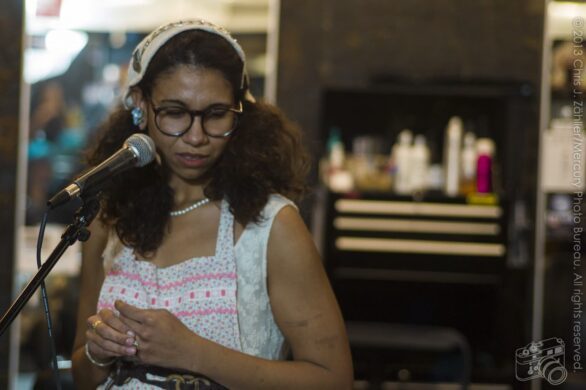
MPBI see you’ve acquired some new equipment; is it on loan, or do you own it?
Cid[guestures at Justin] — He’s moved in —
MPBYou’re not the dog sitter anymore.
CidI took him in!
ShrazHe’s officially a tenant.
CidYup; we took him in and he brought all his recording stuff with him and said, We’re gonna go to work!
ShrazSo, we’re just trying to [record] all the stuff that we have; we have everything down, but we just need to get it recorded […]. We have all the instrumental [tracks; we just need to record the vocals and other layers].
MPBHow many finished songs have you written?
ShrazFinished? Between seven and ten.
MPBAre there some unfinished ones that might end up on a release
CidOh, yeah. You gotta understand, me and Taylor had tons of stuff [written] before we met each other […]. I’m still picking up old notes and then coming up to Taylor, who’ll have these great little ditties on his guitar, and coming in and saying, Wait! I have something!
and creating […] songs out of the blue.
Justin HoganWhat’s cool is, I could hit just one note on the keyboard, and [snaps fingers] [Cid] starts singing. I can hit one note on the keyboard, and we get a whole song out of it! It’s pretty amazing […].
ShrazThroughout my life […], I’ve always played [music] alone. I’ve never had anyone to play with. All my friends were musicians, but everytime I asked, Hey, guys! You wanna play?
[they’d answer] Naah; we’re playing with these guys.
—
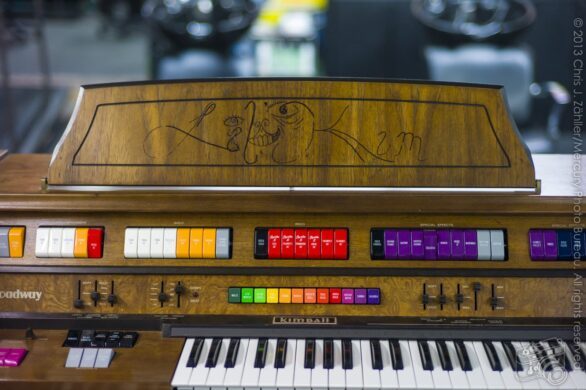
JustinBastards!
Shraz— and no one ever jammed with me. So, when I finally [met] Hogan, he […] took the time to listen, [to help me] focus, [to] calm down a little bit, and then [he] jammed with me […].
MPBIt’s time to play “redeem a song.” What’s a musical guilty pleasure of yours, and what qualities make it worthwhile?
CidOhhh, noooo! I’ve gotta think for a little bit. Alright; this is terrible. This song, the only way that this song can mean anything to you, is if you are at your all time lowest […]. It’s Riddla on da Roof, by [rapper] South Park Mexican. It’s one of those things that you may think is just silly; the lyrics are terrible, it’s just a repetitive song; but then you start thinking about this person who, he doesn’t have very much — he thinks he’s living a life, yet he’s living [that] life in one town; it’s the best thing that he’s ever gonna get, and to him it’s fantastic and he’s gonna die loving it — but in your head, you’re just stuck here in this rut in yourself, and it makes you sad, too.
ShrazWhen it comes to [music I like], I will tell everyone about it. But, I could say something that I do find admirable, that isn’t something that everyone [else] does. [It’s] by M.F. Doom, the villain himself, for his DANGERDOOM [Sidenote: DANGERDOOM is a musical collaboration between DJ/producer Danger Mouse and rapper/producer MF Doom.] project, and he does one called Vats of Urine,
CidI knew you were gonna say that!
ShrazAnd the whole, entire rap is about p*ss. But, if you weren’t told the title […] — he just says “urine” at the beginning — you would just bob your head and get lost in it, lost in the music, and his flow is so crisp and clean that you forget […] that he’s talking about peeing.
MPBIs there anything else you’d like to say?
ShrazThis is a brand thing for both of us, and there’s a lot to come, because we haven’t brought in the full aspect of what do, yet […].
CidWe’d like to remind people that this has been only over the course of a month.
MPBYour heads must be spinning.
Gallery
Gallery: Bowlsey at the Velvet Monkey
